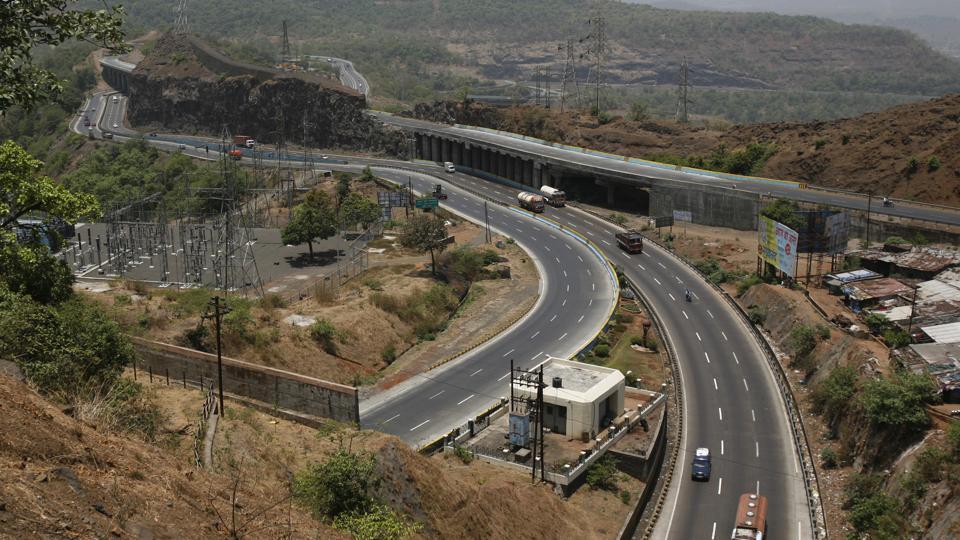 MUMBAI:Mumbai city news: To ensure the work is carried out smoothly, they are stopping the traffic on the highway and letting them move after ten to fifteen minutes
In an effort to prevent landslides on the Mumbai-Pune Expressway, the state highway authorities have started removing loose soil and boulders from the adjacent hills.
The ensure the work is carried out smoothly, they are stopping the traffic on the highway and letting them move after ten to fifteen minutes.
“Vehicular movement on the road will be severely affected if the soil and boulders fall off on the highway. As a precautionary measure, they are being removed from the hills,” said an official from the state highway authorities.
“This operation has been going on for the past two to three days. At this moment, we cannot say how much time it will take to finish the task,” he further said
MUMBAI:Mumbai city news: To ensure the work is carried out smoothly, they are stopping the traffic on the highway and letting them move after ten to fifteen minutes
In an effort to prevent landslides on the Mumbai-Pune Expressway, the state highway authorities have started removing loose soil and boulders from the adjacent hills.
The ensure the work is carried out smoothly, they are stopping the traffic on the highway and letting them move after ten to fifteen minutes.
“Vehicular movement on the road will be severely affected if the soil and boulders fall off on the highway. As a precautionary measure, they are being removed from the hills,” said an official from the state highway authorities.
“This operation has been going on for the past two to three days. At this moment, we cannot say how much time it will take to finish the task,” he further said
Landslide hits Mumbai suburb, one child injured
MMNN:24 Jun 2017
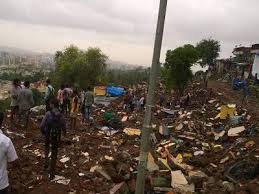 MUMBAI: A two-year-old boy, Alok Sahane, sustained serious injuries after debris lying on the hill slope fell onto his house at Jagdusha Nagar slum in Ghatkopar (West) on Saturday morning. The boy was admitted in Rajawadi Hospital and is now out of danger.
Recently, BMC demolished several slums on the hill slope adjoining Tansa Pipeline (that brings water from lakes in neighbouring districts to Mumbai) following a high court order. The civic authority left the debris unattended after demolishing the houses and it was gradually moving down after intermediate showers in the last few days. On Saturday, around 7 pm, the debris hit around four houses injuring the boy.
"We have been requesting the administration to remove the debris lying on the hill slope since long. But they didn't pay any attention to our demands and today the debris has fallen on the houses injuring a boy. The civic administration is playing with the lives of people here," said local corporator Suresh Patil.
MUMBAI: A two-year-old boy, Alok Sahane, sustained serious injuries after debris lying on the hill slope fell onto his house at Jagdusha Nagar slum in Ghatkopar (West) on Saturday morning. The boy was admitted in Rajawadi Hospital and is now out of danger.
Recently, BMC demolished several slums on the hill slope adjoining Tansa Pipeline (that brings water from lakes in neighbouring districts to Mumbai) following a high court order. The civic authority left the debris unattended after demolishing the houses and it was gradually moving down after intermediate showers in the last few days. On Saturday, around 7 pm, the debris hit around four houses injuring the boy.
"We have been requesting the administration to remove the debris lying on the hill slope since long. But they didn't pay any attention to our demands and today the debris has fallen on the houses injuring a boy. The civic administration is playing with the lives of people here," said local corporator Suresh Patil.
Maharashtra planning law to regulate day care centres
MMNN:17 April 2017
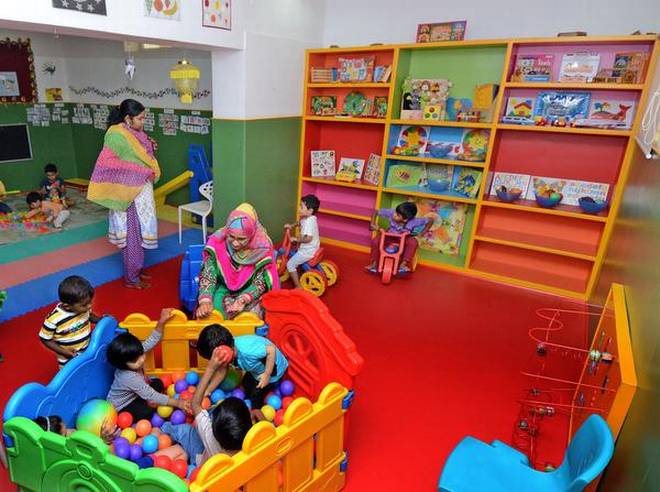 The Maharashtra government has set up a 15-member committee to draft a Bill to regulate the creches and day care centres run by the Social Welfare Board, local bodies, NGOs, and private individuals.
The Maharashtra government has set up a 15-member committee to draft a Bill to regulate the creches and day care centres run by the Social Welfare Board, local bodies, NGOs, and private individuals.
The need for such an Bill arose after the incident in Kharghar in last November, where a 10-month-old girl was assaulted by a day care centre employee, which was caught on camera. In the winter session of the legislature, Women and Child Welfare Minister Pankaja Munde had assured the House that the government would come up with regulations to govern creches.
The committee will be headed by the chief secretary and will have additional chief secretaries of the Home and Public Health departments, along with principal secretaries of the Urban Development, Labour, School Education, Law and Judiciary, Tribal Development, General Administration, and the Rural Development departments. Women and Child Development Commission and secretary of the department will also be the part of the committee along with the commissioner of Integrated Child Development Services schemes.
The committee's mandate will be to draft a law to control and regularise the functioning of creches, lay down rules and regulations, and to provide suggestions to ensure a healthy, clean and safe environment for children.
Apart from the Women and Child Welfare department, other agencies such as the Urban Development, School Education, Tribal Development, Social Justice, and the Labour department are running creches. "The Home Department must be taken on board to discuss safety aspects," said an official.
Scorcher alert for Maharashtra, but Mumbai won't get too hot
MUMBAI: MMNN:17 April 2017
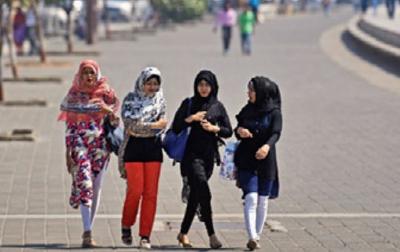 A heatwave alert has been sounded for Vidarbha, Marathwada and a few isolated areas in the state till April 18 which could push up temperatures in these regions by 4-5 degrees above normal. The maximum temperature in the city though may not see a significant change.
A heatwave alert has been sounded for Vidarbha, Marathwada and a few isolated areas in the state till April 18 which could push up temperatures in these regions by 4-5 degrees above normal. The maximum temperature in the city though may not see a significant change.
Weather officials said that a few districts in the above regions have already been recording temperatures above 40 degrees Celsius.
"Temperatures could go 4-5 degrees above normal over the next three or four days. Some of these places are already witnessing temperature levels of around 40-42 degrees Celsius, so essentially the change could be of another 1-2 degrees," said VK Rajeev, director, India Meteorological Department (western).
Explaining the reason behind a second spell of heatwave, KS Hosalikar, deputy director general (western region), IMD, said that the position of upper air anticyclone over Gujarat region is bringing warm and dry north easterly winds. "It's showing up in interior Maharashtra with heatwaves in central Maharashtra, Marathwada and Vidarbha. Temperature in parts of interior Maharashtra is already around 44-45 degrees," he added.
Rajeev said there are chances that Mumbai may escape the scorching heat. "Mumbai continues to have a maximum temperature of 34-35 degrees and it is likely to remain so," he said. Hosalikar too said that the city is experiencing heat due to high humidity levels in the afternoon. On Sunday, the maximum temperature recorded in Santacruz was 33.6 degrees and in Colaba it was around 34.8 degrees Celsius. Humidity levels hovered around 74% for both areas.
Besides Maharashtra, heatwave conditions are likely to prevail in Rajasthan, west Madhya Pradesh, Saurashtra, Kutch, Punjab and Haryana, the IMD said. The state will experience the second spell of the year which already saw an early advent of heatwave in mid-March. Bhira village in Raigad had grabbed national headlines after touching a maximum of 46.5 degrees on March 29.
The first spell in March claimed nine lives while more than 16 people needed aggressive treatment for heat strokes. The deaths were recorded from Aurangabad, Beed, Jalgaon and Solapur.
Maharashtra tax arrears climb up to Rs 72,801 crore
MMNN:20 March 2017
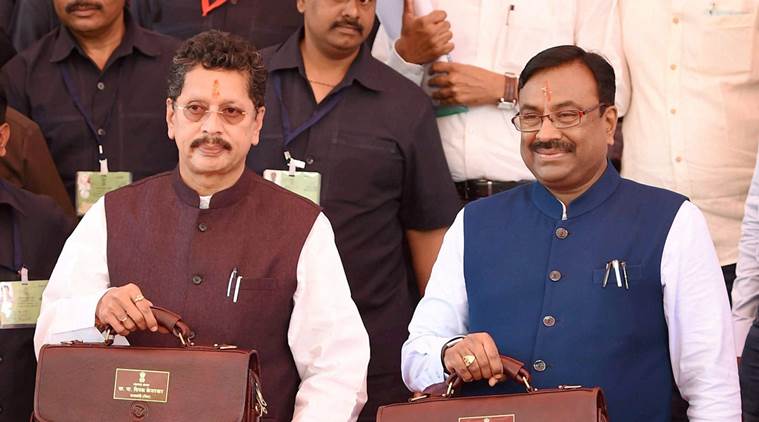 Tax arrears in Maharashtra have now shot up to a staggering Rs 72,801 crore, prompting the state government to beef up the collection of arrears. The tax arrears are nearly equal to the state's development programme for 2017-18, which is estimated at Rs 77,184 crore. These arrears, if realised, would have wiped off the state's fiscal deficit, or gross annual borrowings of the state government, which stood at Rs 50,318 crore. This, in turn, would have reduced the amount spent for servicing the rising debt, which has now risen to Rs 3.71 lakh crore.
Tax arrears in Maharashtra have now shot up to a staggering Rs 72,801 crore, prompting the state government to beef up the collection of arrears. The tax arrears are nearly equal to the state's development programme for 2017-18, which is estimated at Rs 77,184 crore. These arrears, if realised, would have wiped off the state's fiscal deficit, or gross annual borrowings of the state government, which stood at Rs 50,318 crore. This, in turn, would have reduced the amount spent for servicing the rising debt, which has now risen to Rs 3.71 lakh crore.
According to the disclosures made in the budget 2017-18 document, arrears accumulated in the past one year alone stood at Rs 13,085 crore. With the Goods and Services Tax (GST) regime likely to be implemented from July 1, 2017, these arrears are a massive black hole for the state, admitted sources. Statistics show that about 15 per cent of the total arrears - Rs 10,867 crore - have been pending for more than a decade.
Finance Minister Sudhir Mungantiwar, while presenting the 2017-18 budget to the legislature Saturday, admitted that it was necessary to dispose of appeals and beef up recoveries of arrears before the GST regime kicked in.
Sales tax, which is the state's highest revenue grosser, accounted for over 70 per cent (Rs 51,000 crore) of the total tax arrears. "The number of appeals filed by dealers under Value Added Tax is significant," admitted Mungantiwar. "The emphasis is on mobilising additional resources through the recovery of pending tax revenue. It is also hoped to recover pending taxes through amnesty schemes," declared Mungantiwar. While claiming that an ongoing amnesty scheme for sales tax had resulted in encouraging recoveries, Mungantiwar went on to vest power with the government in writing off interest and penalties in certain cases and also formulate a plan for speedy recovery of arrears. Besides this, three more tribunal benches are proposed to be set up for speedy disposal of appeals. In sales tax matters, amounts locked in appeals currently stand at Rs 35,351 crore.
Further, dangling a carrot to traders, the state increased the time limit to file appeals against tax raised by the sales tax department from four months to six months. The power to remand back ex-parte assessment orders issued by the assessing officer was also provided to the appellate authority. The part payment to be made for seeking stay on recovery notices was also fixed at 10 per cent of the dues or Rs 15 crore, whichever lower.
Directors of a private limited company will now be held liable for sales tax dues of their company. The Central Sales Tax has pending tax recoveries totalling Rs 17,874 crore, whereas arrears in land revenue were Rs 909 crore. Another Rs 974 crore was pending in premiums levied on miners for extraction of major minerals, while Rs 522 crore was pending in electricity duties. Collective arrears in non-tax revenues, meanwhile, stood at Rs 3,074 crore.
Maharashtra Professor Beaten Up, Arrested for Asking Why Shivaji's Birthday Is Celebrated Twice
MUMBAI: MMNN:20 March 2017
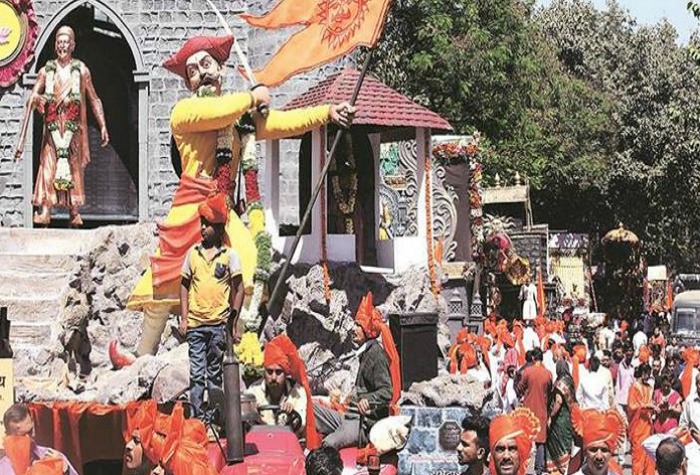 We all know that Article 19(1)(a) of the Indian constitution enshrines the right to freedom of speech and expression to all citizen. But in reality, this right doesn't seem to hold too much value in our country.
We all know that Article 19(1)(a) of the Indian constitution enshrines the right to freedom of speech and expression to all citizen. But in reality, this right doesn't seem to hold too much value in our country.
In a shocking incident, a 38-year-old professor from Khopoli, Maharashtra has been arrested after he questioned as to why is Chhatrapati Shivaji's birthday celebrated twice a year.
It all started with a mere WhatsApp message, where professor Sunil Waghmare, the head of the department of commerce at the KMC college in Raigad, questioned the logic behind celebrating birthday twice in a year.
The WhatsApp group consisted of Waghmare's fellow college professors and other staff. The group admin Amol Nagargoje, scolded Waghmare's 'blasphemous' question, following which he deleted the group altogether.
Shivaji's exact date-of-birth is not known and it is celebrated twice a year, in February and March.
News about the heated WhatsApp argument spread through the college and the next day, Waghmare was beaten up by students and teachers at the college and the police had to intervene to protect him.
The Maratha Swarajya Samajik Sanstha president Sagar More too lodged a complaint with the Khopoli police against Waghmare.
Khopoli assistant inspector Ashok Thakur said, "After the post was circulated, tension escalated on college premises. We deployed police teams in the college to maintain law and order. Those who tried to stage protests were dispersed."
Amol Nagargoje, went on to register a case against Waghmare under Section 295a (deliberate and malicious acts intended to outrage religious beliefs) of the Indian Penal Code
"He is senior faculty and I know him since 2012. That night on WhatsApp, when he made the comment, I asked him to take back his words but he refused.
So, I decided to delete the group altogether. On Friday, when I was in the staff room, I got to know that he was attacked," the Mid-Day quoted Nagargoje as saying.
Maharashtra announces steps to ease farmers' distress amid rising suicides
MMNN:6 March 2017
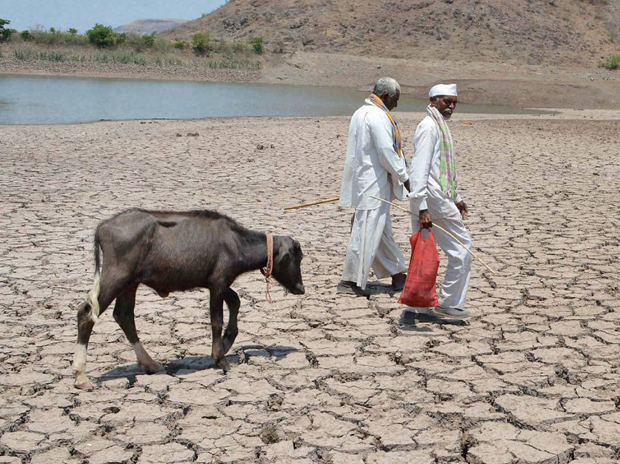 The BJP-led government in Maharashtra on Monday announced a slew of decisions to mitigate agrarian distress and to boost the flow of investments in order to maintain its pre-eminence as the favoured destination.
The BJP-led government in Maharashtra on Monday announced a slew of decisions to mitigate agrarian distress and to boost the flow of investments in order to maintain its pre-eminence as the favoured destination.
The farmer-friendly measures include sustainable development schemes, marketing support, crop insurance, water conservation, irrigation and agricultural diversification. The government hopes that these steps will help double farmers' income during the next five years.
State Governor C Vidyasagar Rao made these announcements in his address during the joint session of the state legislature.
The timing of these announcements is crucial when the chorus for farm loan waiver is increasing. The state relief and rehabilitation department in its report revealed that a record 3,052 farmers suicides took place during January-December 2016.
Further, the Governor said the government will introduce a project for climate resilient agriculture and the World Bank assisted scheme entailing an investment of Rs 4,000 crore is being rolled out to ensure drought proofing of 4000 villages of Vidarbha and Marathwada. The project aims to mitigate the soil and ground water salinity problem in 1000 villages of Purna river basis in Vidarbha region where the number of farmers suicides are high.
More than 250,000 works were completed and 1.2 million thousand cubic meters of water storage potential was created under the Jalyukta Shivar Abhiyan (water conservation scheme) which was launched in December 2014. Nearly 11,000 villagtes have been made drought proff by conserving every drop of water in village watershed.
On attracting investments, the Governor said Maharashtra continues to top the list as its share in the total foreign direct investment inflow in India in the past six months has risen to 50%. Further, the Maharashtra Industry, Trade and Investment Facilitation Cell (MAITRI), which acts as a single window for 44 industrial clearances required across 18 departments, has so far facilitated unlocking investment of over Rs 85,000 crore and employment potential of 1.55 lakh. The government has reduced number of approvals to 47 from 74 for ease of doing business and implemented several reforms to make the administrative process industry and investor friendly.
On the implementation of infrastructure development, the government will build the Mumbai Nagpur super communication expressway with an estimated cost of Rs 46,000 crore. The government has approved capacity augmentation of Pune Mubai expressway to remove the congestion at the cost of Rs 3,215 crore. This apart, about 3,600 km of state highways will be upgraded to national highways by May 2019 with an investment of Rs 24,000 crore.
As far as transportation infrastructure in Mumbai is concerned, the works of Mumbai Metro 3, Mumbai Metro line 2A, Mumbai Metro line 7 have already started and the Navi Mumbai metro is expected to be complete by 2018. The state government has inked joint venture agreement with the Ministry of Railways to set up Maharashtra Railway Infrastructure Development Company to put implementation of railway projects on fast track.
BMC polls success: Is Maharashtra turning into a new BJP bastion?
MUMBAI: MMNN:6 March 2017
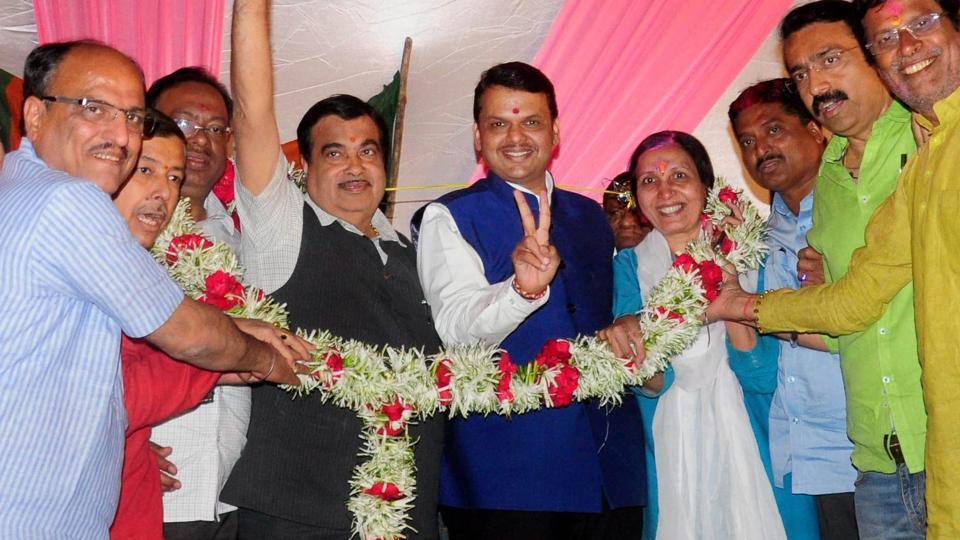 The recently announced results of the local body elections in Maharashtra have come as a shock for opposition parties who were hoping the tide would turn against the ruling Bharatiya Janata Party (BJP) that has been on a winning streak in the state since 2014. They were hopeful the inconvenience faced by the people because of demonetisation and the resentment in rural areas would reflect in the election results, declared on February 21. Much to their dismay, on the contrary, the results have shown that the BJP has established complete domination in cities and strong presence in rural areas.
The recently announced results of the local body elections in Maharashtra have come as a shock for opposition parties who were hoping the tide would turn against the ruling Bharatiya Janata Party (BJP) that has been on a winning streak in the state since 2014. They were hopeful the inconvenience faced by the people because of demonetisation and the resentment in rural areas would reflect in the election results, declared on February 21. Much to their dismay, on the contrary, the results have shown that the BJP has established complete domination in cities and strong presence in rural areas.
It either won majority seats or emerged as largest party in 8 out of 10 civic bodies. In Mumbai, it has won just two seats less than the Shiv Sena, which somehow managed to emerge as the largest party. The BJP also won maximum seats in 10 ZPs that handle rural governance and polled sizeable number of votes in other 15.
This is a hat-trick of wins for the BJP in Maharashtra. In 2014, it won 42 (including one by its ally Raju Shetti) out of 48 Lok Sabha seats. Six months later, it tripled its strength in the assembly to bag 122 seats and won power. Now it has dominated the local self-government elections. For a party that struggled, not too long ago, to make inroads into the state, which was often seen as a Congress bastion, this is a major achievement. And the way the opposition Congress and the Nationalist Congress Party (NCP) are struggling, the big question in the political circles is: Will the BJP turn Maharashtra into its another stronghold like neighbouring Gujarat, Madhya Pradesh and Chhattisgarh?
The early years in Maharashtra
The BJP, a post-emergency offshoot of the Bharatiya Jana Sagha, was born in Mumbai in 1980. But even a decade after its inception, the party was not a strong political force in the state. It was BJP leader late Vasantrao Bhagwat who made the first serious attempt to make it a mass-based party. He coined the term 'MADHAVAM,' the Marathi acronym is the combination of initials of non-Bramhin castes - Mali (gardeners), Dhangar (shephards), Vanjari and Maratha. Three of the communities are from the Other Backward Classes while Maratha is the politically dominant caste. Accordingly, the BJP promoted leaders such as Gopinath Munde (Vanjari), N S Pharande (Mali), Anna Dange (Dhangar) and late Suryabhan Vahadane. It yielded results as the BJP established itself among the OBCs, who were unhappy with the Congress which promoted Marathas, Muslims and Dalits. The party first managed to do well electorally in the 1990 assembly elections in alliance with the Shiv Sena. It was late Pramod Mahajan who understood the significance of joining hands with the Shiv Sena to expand the party's base.
The rise of BJP
The Shiv Sena got first test of BJP's ambitions in 1991 when its leader Chhagan Bhujbal defected to the Congress with a group of legislators, shrinking the party's tally in the assembly. The BJP became the bigger opposition party. Munde then spent no time in approaching the assembly speaker to stake claim on the opposition leader's post. He used the post to the advantage of the party by launching an aggressive campaign over corruption and criminalization of politics targeting then chief minister Sharad Pawar. The Ram Mandir agitation followed by Mumbai communal riots led to polarisation of votes that helped the BJP-Sena to win power for the first time in the state. At that time the Sena was big brother in terms of seats in assembly and the BJP had to play role of a junior partner. Following a split in the Congress that saw Sharad Pawar floating his Nationalist Congress Party, Mahajan convinced Bal Thackeray to go for elections along with the Lok Sabha in 1999. Mahajan's plan was to take advantage of the split in Congress and get the NCP on board to form a government. Pawar, however, chose to go with the Congress.
Maharashtra results no referendum on note-ban, says Chidambaram
MMNN:25 Feb. 2017
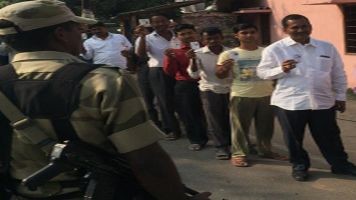 The results of civic polls in Maharashtra should not be considered a referendum on the demonetisation, senior Congress leader P Chidambaram said today. He also suggested that as with the sterilisation during the Emergency, people's anger may manifest itself later. BJP made impressive gains in the civic elections in Mumbai and elsewhere in Maharashtra.
The results of civic polls in Maharashtra should not be considered a referendum on the demonetisation, senior Congress leader P Chidambaram said today. He also suggested that as with the sterilisation during the Emergency, people's anger may manifest itself later. BJP made impressive gains in the civic elections in Mumbai and elsewhere in Maharashtra.
"It only shows that the Indian people are extremely patient and stoic. But that does not mean that there is no anger. During the Emergency there was a widespread belief that sterilisation was forced on the people. There were no street protests... But that does not mean that people have accepted it," the former Finance Minister said here.
"Assuming that the story (about anger regarding sterilisation) was true and assuming that the anger of the people is justified, they expressed their resentment at an appropriate time. No election is a referendum on any one issue," Chidambaram said at an interactive session here.
"Demonetisation has affected practically every family in India... everyone is nursing a grievance," he said. Due to the note ban decision of Narendra Modi government, the economy will grow at 6 to 6.5 per cent in the current fiscal and the NPAs of banks will rise, he predicted. To a question about Jammu and Kashmir, he said the situation there was grim, and a series of mistakes were made which are "almost too late" to correct now. He also criticised recent controversial comments of the Army Chief Bipin Rawat.
"General Rawat said anyone interfering with security operations will be treated as anti-national. That's, I think, thoughtless, intemperate words," the former Union Home Minister said. About Mukesh Ambani's telecom venture Reliance Jio, he said "disruption" is good, as it promotes innovation.
"Disruption is good... advent of Jio has forced the telecom industry to consolidate... that is good for the country. Imagine if the voice becomes totally free, you will never stop talking. That's is the kind of disruption required in this country," Chidambaram said.
Bombay HC asks Maharashtra to identify new office space for state Human Rights Commission
MUMBAI: MMNN:25 Feb. 2017
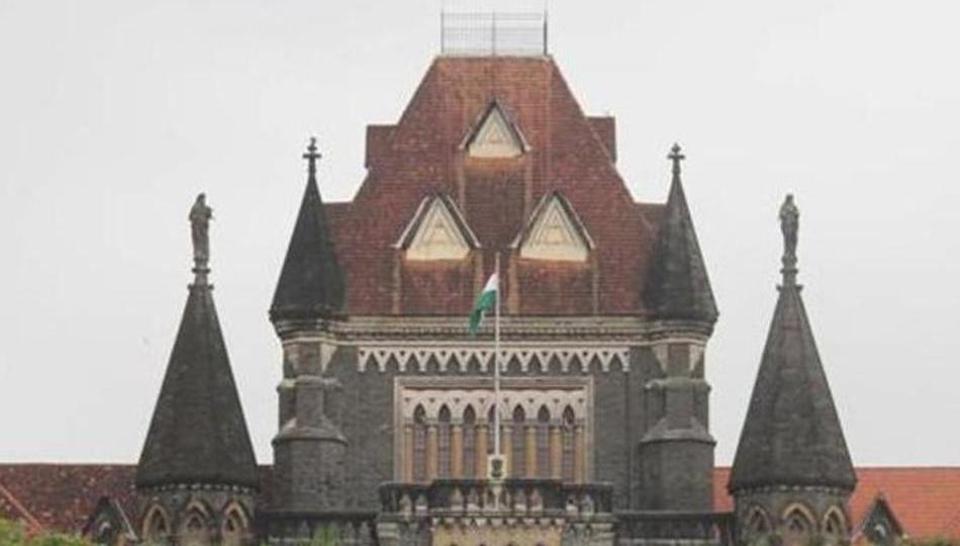 The Bombay High Court on Friday directed the Maharashtra government to identify within two weeks, a new, larger office for the state Human Rights Commission.
The Bombay High Court on Friday directed the Maharashtra government to identify within two weeks, a new, larger office for the state Human Rights Commission.
A bench of Justices VM Kanade and PR Bora also criticised the state government for prolonging the issue, and for compelling the human rights body to seek the court's intervention to secure its own basic rights.
The court was hearing a plea filed by the Commission seeking a direction to the state to allot it a new, spacious office to help accommodate its staff. The commission that is burdened with pendency has been battling shortages of funds and staff, and even the lack of a proper office for months, and have failed to get an adequate response from the state despite repeated representations and previous court orders.
The Commission currently operates from a small office near the Chhatrapati Shivaji Terminus railway station. It however, has said that it needs a new office space of around 800 to 1,000 square feet.
The state government meanwhile, told the court on Friday that in compliance with a previous order, the Principal Secretaries of departments of General Administration, finance, law, and Home, had conducted a joint meeting last month to address issues of paucity of staff and funds faced by the commission. However, it was proving difficult to allot a new office to the commission since "there is no space."
"We have failed to identify a suitable space for them. We are now looking at a 500 square feet open area near the Motor Accidents Claims Tribunal office near Azad Maidan and are hoping to develop it into an office space for the commission. But this will require time. We have also asked the PWD to look for other suitable spaces," the state said.
At this, Justice Kanade reminded the state that it was "obligated by the central Human Rights Commission Act" to provide for adequate funds, office space, and staff for the commission.
"If the state wants to do something, it can do so overnight. We have witnessed how the finance department is capable of prolonging things despite giving assurances to the court. Why don't you look at the Air India Building, or the MTNL building?" the bench said.
Third phase of Maharashtra local polls sees 72.76% turnout
MMNN:19 Dec. 2016
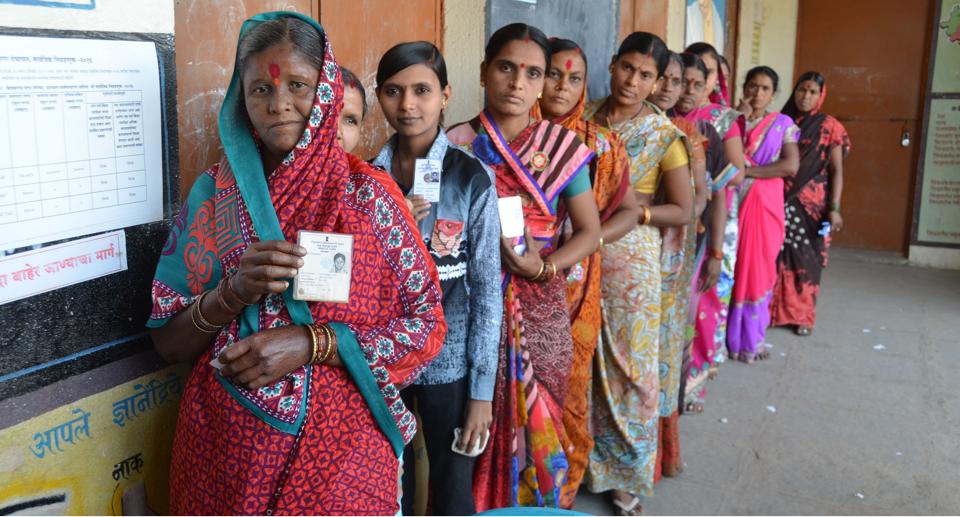 The third phase of the local body elections in Maharashtra for 19 municipal councils and two nagar panchayats in the Aurangabad, Nanded, Gadchiroli and Bhandara districts on Sunday saw an overall turnout of 72.76% among the 5.16 lakh registered voters.
The third phase of the local body elections in Maharashtra for 19 municipal councils and two nagar panchayats in the Aurangabad, Nanded, Gadchiroli and Bhandara districts on Sunday saw an overall turnout of 72.76% among the 5.16 lakh registered voters.
Voting to these local bodies, with a majority of them being Congress' strongholds, began at 7.30am and went on till 5.30 pm. The votes will be counted on Monday from 10am onwards.
A total of 1,947 candidates were in the fray for 409 seats across the local bodies. Like in the first two phases, the council presidents are also being elected directly by the people, as per information from the State Election Commission (SEC). There are 111 candidates for the 19 president posts.
The local bodies where polling took place included Kannad, Paithan, Gangapur and Khultabad in Aurangabad, with the Congress currently having a majority in three of the four councils. From Nanded, the councils and nagar panchayats going to polls included Dharmabad, Umri, Hadgaon, Mukhed, Biloli, Kandhar, Kundalwadi, Mudkhed, Deglur, Ardhapur and Mahur. The Congress and Nationalist Congress Party (NCP) have a majority in four of these local bodies, while the former controls a larger share of the district in terms of the number of seats.
From Bhandara, the Pavni, Bhandara and Tumsar councils along with the newly-formed nagar panchayat of Sakori went to the polls.
The NCP has 30 of the existing 72 seats across the local bodies, with a majority in the Bhandara and Tumsar councils, while the Shiv Sena controls the Pavni municipal council.
The third phase also included voting to two municipal councils in the Vidarbha region, traditionally a Bharatiya Janata Party (BJP) stronghold, in the Gadchiroli district - Gadchiroli and Desaiganj.
The Desaiganj council polls have been mired in controversy with Mahadev Jankar, a cabinet minister in the BJP-led state government, battling charges of attempting to pressurise an election officer to give a favourable symbol to his candidate in Desaiganj. The returning officer has registered a criminal case against Jankar, founder and president of BJP ally Rashtriya Samaj Paksha, while the minister continues to deny allegations.
"Following the case, the election to ward number 9-B in the Desaiganj municipal council was scrapped. Election to the seat will now take place on January 22, 2017, as per the revised schedule," an SEC official said.
He added, election to the Vaijapur municipal council were also scheduled to be held on Sunday, but had to be postponed because of a court-mandated stay.
So far, the BJP swept the first two phases. Notwithstanding the opposition's barbs over alleged corruption and demonetisation, the BJP stamped its popularity with a clear lead in the first phase of elections for 147 municipal councils and 18 nagar panchayats.
It also made deep inroads into the bastions of the Congress and NCP in the second phase of polls to 14 municipal councils in Pune and Latur, wining the maximum number of council president posts and being a close second to the NCP in terms of the number of member seats.
A total of 212 municipal councils and nagar panchayats across the state are to go to polls in four phases. The polls are said to give an insight into whether the ruling BJP still holds sway among the public, and if the Congress and NCP, reduced to bits during the 2014 Lok Sabha and state assembly elections, are still popular in Maharashtra's semi-urban centres.
The last phase of the local polls is scheduled on January 8.
Maharashtra doesn't need BJP's development vision: Shiv Sena
MUMBAI: : MMNN:19 Dec. 2016
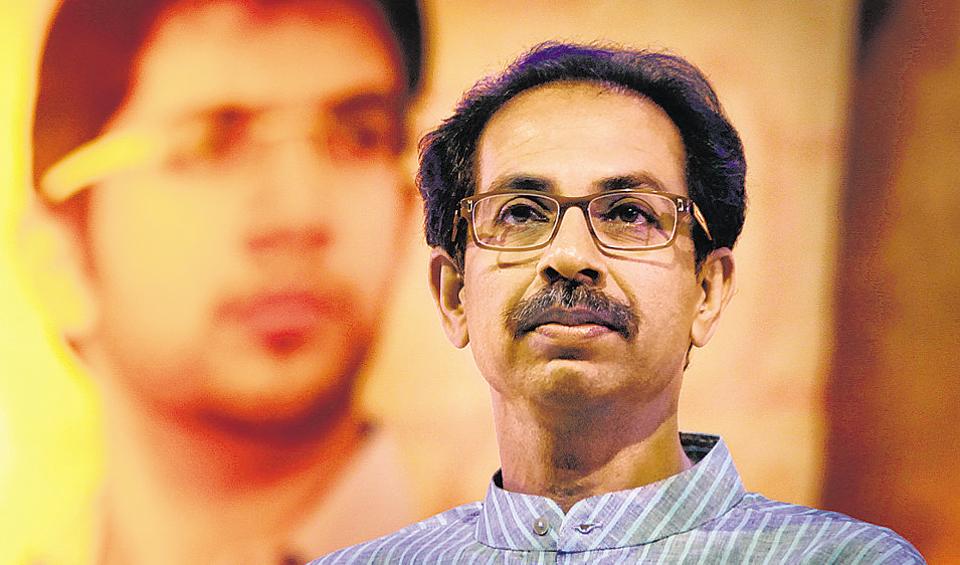 Criticising the Bharatiya Janata Party (BJP) over demonetisation, corruption and violence at the border, the Shiv Sena on Monday said its ally should keep its supposed vision for development to itself and the Maharashtra of Chhatrapati Shivaji and the Shiv Sena chief doesn't need any of it.
Criticising the Bharatiya Janata Party (BJP) over demonetisation, corruption and violence at the border, the Shiv Sena on Monday said its ally should keep its supposed vision for development to itself and the Maharashtra of Chhatrapati Shivaji and the Shiv Sena chief doesn't need any of it.
In an editorial in the party's mouthpiece Saamana, the Sena said the BJP's tactic at the Centre and the state is all about creating a vision, despite whatever may happen on the ground.
Directly lashing out at chief minister Devendra Fadnavis, the party said, "Apparently in an unofficial chat in Nagpur, the chief minister said the alliance (with Shiv Sena) will only happen if the party accepts BJP's vision for development. If the conversation was unofficial how did it get widely published?" The Sena, however, added that it doesn't need to seek any clarification on it, knowing that the BJP's way of doing things in the country as well as other states is by stating grand visions.
"Just when the chief minister was talking about crimes being on the decline, in Nagpur itself there were four murders in just 20 hours. But since there's a 'vision' about good law and order, journalists should now start writing that these weren't murders and people just decided to peacefully rest. This is how the BJP's vision is like," the Sena said in the Saamana editorial.
The party also took a jibe at the CM's pet Mumbai-Nagpur Expressway project, saying that the BJP has shown a vision that it will bring prosperity to districts along the alignment and increase land prices along the way. "But the vision that has surfaced, of officials close to the ruling party buying land along the proposed route at cheap rates, is shocking. But instead of seeing this as a multi-acre land scam, we should all look at it as just a vision," the Sena said.
Over the last few weeks, Shiv Sena chief Uddhav Thackeray and the chief minister projected an image that relations between them were warm and cordial while sharing stage several times and praising each others' work.
The Sena, however, continued to lash out against the BJP over the implementation of demonetisation, whereby the government suddenly decommissioned old Rs 500 and Rs 1,000 currency notes, massively inconveniencing people.
The Shiv Sena's latest barbs come at a time when the Mumbai civic polls are less than two months away, and there is still a cloud of uncertainty over a Sena-BJP alliance for the polls.
Eyeing Rs 150-200 per tonne loss, Maharashtra sugar mills to set to end season in red
Pune:MMNN:15 Dec. 2016
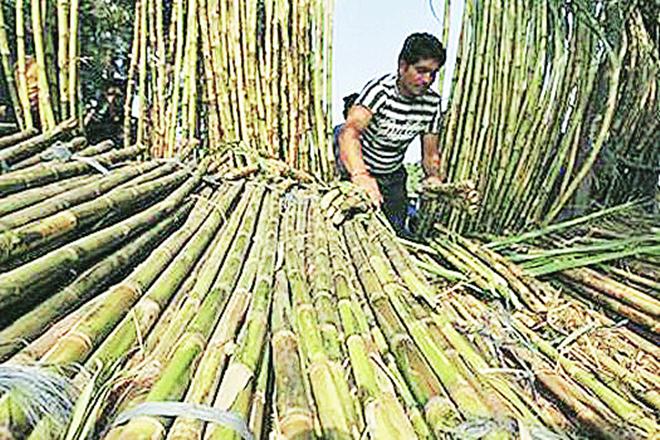 Maharashtra sugar mills are caught in a tight position in the 2015-16 season. Facing cane shortage, most mills may be forced to put up with losses to the tune of R150-200 per tonne this season, top officials of the Maharashtra Cooperative Mills Federation said.
Maharashtra sugar mills are caught in a tight position in the 2015-16 season. Facing cane shortage, most mills may be forced to put up with losses to the tune of R150-200 per tonne this season, top officials of the Maharashtra Cooperative Mills Federation said.
Officials from the Western India Sugar Mills Association (WISMA) fear that losses could be more and the government may be required to intervene at some point.
According to Maharashtra State Cooperative Sugar Factories Federation (MSCSFF) chairman Shivajirao Nagawade, this has been one of the most challenging seasons faced by the sector. With less cane availability, mills in Solapur, Ahmednagar, Pune, Nashik, Marathwada and Vidarbha regions could end up shutting early, either by January-end or February 15, he said. Only mills in western Maharashtra are likely to run till April-May, he pointed out.
"The cane shortage is likely to hit the season hard, he said, adding that most mills have been forced to declare the first cane instalment cane prices way above the Fair and Remunerative Price (FRP). Only those mills producing ethanol that is commanding good rates and running cogeneration plants for which the government is offering attractive rates per unit in addition to a subsidy are in a position to pay cane instalments way above FRP. Since there is less cane available, most mills are forced to pay higher prices," Nagawade said.
Sanjeev Babar, MD of the federation agreed and said that mills have been declaring first cane instalments in the range of R2,500-2,900 per tonne in some cases which could end up causing problems.
While millers in western Maharashtra's cane-rich Sangli in Kolhapur region agreed to pay R175 per tonne over and above the fair and remunerative price fixed by the Centre, other millers were forced to follow suit because of cane shortage.
According to WISMA vice-president Rohit Pawar, barring five-six mills in Pune district that have their own cane, most mills are likely to end the season by January 10. Barely one mill is operating in Osmanabad, two in Beed and some 12 in Solapur, he said, adding that financially the situation among mills is very poor and several mills could end up in NPAs.
Because of the short season, the off-season for most mills could stretch to some eight-nine months which means most mills may not be in a position to pay employee salaries, he said.
Moreover, sugar prices have remained at R33 per kg for the last six months and if the prices move higher, the government will likely intervene which means that the mills may be forced to sell sugar at capped prices while raw material prices go up and therefore losses could be much higher, Pawar pointed out.
Overall, the cane shortage in the state is to the tune of 31-42% as compared to the last season and mills in Maharashtra and Karnataka are likely to face losses, he warned.
Besides employee salaries, the instalments of the soft loans are also coming up which means mills may not be in a position to pay up and the working capital loans may be affected, Pawar said, adding that the season cycle is likely to be affected to such an extent that government intervention may be required. There may no other option other than restructuring of loans, he added.
Several millers from Maharashtra have already met Union finance minister Arun Jaitley with a demand for restructuring of loans earlier without success. As on date, at least 142 mills in the state are crushing cane.
Rs 5,000 crore put into Maharashtra cooperative banks in just 4 days
MUMBAI: : MMNN:15 Dec. 2016
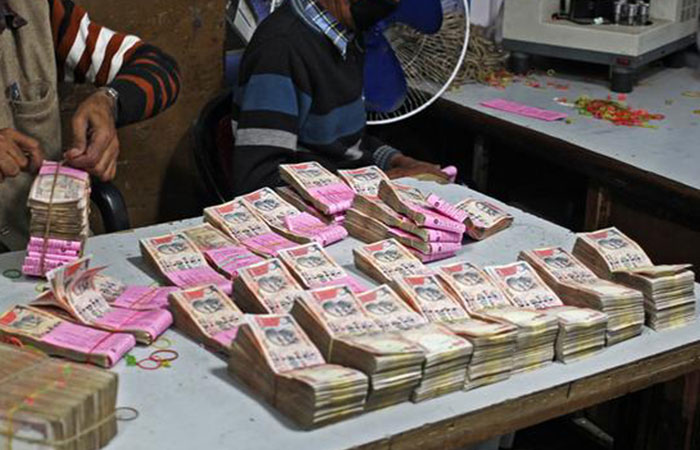 District credit cooperative (DCC) banks in Maharashtra received Rs 5,000 crore in old notes of Rs 500 and Rs 1,000 denomination in just four days, from November 10 to 14, when they were allowed to accept demonetised currency.
District credit cooperative (DCC) banks in Maharashtra received Rs 5,000 crore in old notes of Rs 500 and Rs 1,000 denomination in just four days, from November 10 to 14, when they were allowed to accept demonetised currency.
As most accounts in these banks are held by farmers, Nabard (National Bank for Agriculture and Rural Development), the apex bank for all these institutions, has now begun scrutiny of the accounts to check for any cases of "suspicious deposits" or financial mismanagement.
Officials say there have been complaints that some accounts have been used to deposit unaccounted cash. Most of the 31 DCC banks in the state are controlled by local politicians and have been hauled up for financial mismanagement in the past. RBI had allowed DCC banks in the state to deposit demonetised notes for only four days in November, during which period their 3,800-plus branches received the huge deposits.
The RBI, though, has neither allowed exchange of banknotes nor any more deposits after that; it has only permitted cash withdrawals of up to Rs 24,000 a week.
"While initially only accounts with more than Rs 2 lakh deposits will be scrutinised, other accounts will come under the scanner too," said a senior official of the state cooperation department.
Nabard officials said the average balance in many of the accounts and past transaction history cannot explain the sudden deposits. Even if the account holder has deposited just Rs 1 lakh, if the past transactions and balance history is in a few thousands, how can the deposit be explained?" asked an official.
He said branches of Sangli DCC bank in Islampur, Shirala and Tasgaon were scrutinised last week. The Sangli DCC bank had collected approximately Rs 320 crore in old notes.The Pune DCC bank received cash deposits of Rs 600 crore.
Officials pointed out that the cash crunch post-demonetisation has seen the weekly withdrawal limit of Rs 24,000 not being met with at most branches. This has led to a huge cascading effect on the rural economy . DCC banks have a wide network and heavy presen ce in rural areas; they have close to 85-90 lakh accounts. A DCC bank is also a key institution in that it disburses farm loans. Considering their reach and cash-rich status, politicians have always vied for cont rol of these banks; most DCC banks in Maharashtra are controlled by NCP and Congress politicians. And instances of fiscal mismanagement have been so frequent that the banks have often been referred to as "piggy banks" of netas.
Despite all this, the clamour for allowing DCC banks to transact is growing, with the argument being put forth that farmers are suffering. Recently, CM Devendra Fadnavis along with politicians who run these banks met finance minister Arun Jaitley demanding that DCC banks be allowed to carry out transactions.
"DCC banks have been saddled with old notes totalling Rs 5,000 crore. We have demanded that the RBI take the money from us because we have to pay interest to depositors, which works out to Rs 55 lakh a day across these banks. There is no reason why RBI should impose restrictions on us. There are only a few accounts with more than Rs 2 lakh deposits," said a senior politician who is also director of a DCC bank.
ISIS case: Maharashtra terrorism squard probes Pak national's India visit
MUMBAI:MMNN:12 Dec. 2016
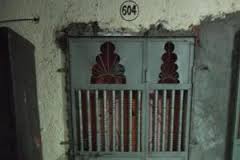 The Maharashtra Anti-terrorism Squad (ATS) probing a 28-year old from Mumbra for reportedly joining the terror group ISIS, are also looking into the visit of a Pakistani national Ali, who had allegedly visited India and stayed here for 10-12 days along with the missing youngster.
The Maharashtra Anti-terrorism Squad (ATS) probing a 28-year old from Mumbra for reportedly joining the terror group ISIS, are also looking into the visit of a Pakistani national Ali, who had allegedly visited India and stayed here for 10-12 days along with the missing youngster.
As per sources, Mumbra man Tabrez Tambe, who used to work in the Middle East, came in contact with Ali and had come to the state with him. ATS is finding out if Ali had tried to radicalise anyone else in Mumbra and is also checking the places he visited in Thane and Mumbai.
Tambe's family hails from Ratnagiri, but are currently staying in Mumbra. The ATS unit, which is probing the case is currently questioning Tambe's mother and his relatives while questioning his friends too.
The squad is trying to verify if the main intention behind Ali's visit was to try and establish an ISIS module in the state. The disappearance of Tambe came to light after his brother Saud Noor Mohammad Tambe approached ATS this week. The brothers are from Ratnagiri and were living in Mumbra.
Tambe became friends with Ali while working in Saudi Arabia. So far, ATS has found that Tambe went to school at the National High School and Junior College in Ratnagiri, before moving to Mumbai to study chemistry at the Mumbai University. He was good at academics, played volleyball and took part in science quizzes. He also volunteered for a charitable organisation and studied cargo services for his undergraduation.
Investigators said Tambe had always been employed at good firms. He started working in 2009, went on to join an airline as a cargo supervisor in 2010 and then moved to Iraq to work as a warehouse executive in 2011. In October 2012, Tambe moved to Dubai, where he worked as a logistics officer. Somewhere around December 2015, he moved to Saudi for a logistics officer profile. This is when he is said to have met Ali.
Saud told ATS officials that he and his family found out last month that Tabrez had left the country to join the ISIS.
Mumbai teacher rapes his student, escapes to Delhi
NAVI MUMBAI : MMNN:12 Dec. 2016
 The Nerul police, who are probing the rape case of a 13-year-old girl of a local school, said the accused, a teacher, is hiding in Delhi. The schoolteacher aged 42 years had been on the run since September when the FIR was registered.
The Nerul police, who are probing the rape case of a 13-year-old girl of a local school, said the accused, a teacher, is hiding in Delhi. The schoolteacher aged 42 years had been on the run since September when the FIR was registered.
The survivor's father works for a private firm in Pune and her mother is a homemaker. The teacher got the minor pregnant after allegedly raping her twice in April and August on the school premises, when the other students attending a physical education training session, the police said.
In September, when the girl complained of nausea and stomach pain, her mother took her to a private doctor who diagnosed her and informed that she was four weeks pregnant. The development shocked the girl's mother and she then broke the news to the girl's father working in Pune. Later, the schoolgirl narrated her ordeal to her mother and claimed that she had kept silent as the teacher had threatened her of dire consequences.
The girl's mother then confronted the teacher, but he denied the allegations.Later, the girl's mother lodged a police complaint. A rape case was registered against the teacher at Nerul police station under the Protection of Children from Sexual Offences Act (POCSO Act).
The teacher, who is married and has one son, fleed from his Koparkhairane residence. Later, his family left the flat. "Over the last two months, we were unable to trace the teacher's whereabouts," said a police official.Adikrao Pol, senior inspector of Nerul police station added, "When the FIR was registered against the tea cher in September, policemen had gone to his residence in Koparkhairane, but he could not be traced.
He had even switched off his mobile phone. As a rape case was registered against him, the school principal had immediately suspended him from his job. A couple of days ago, we tracked down his location to Delhi."
A team has reached Delhi and is coordinating with the local law-enforcement officials to arrest him. "The alleged sexual assault on the minor came to light only after five months when she had become pregnant after which she confided in her mother and revealed the name of the teacher," .
Maharashtra links farmer suicides to need for Maratha quota
MUMBAI:MMNN:8 Dec. 2016
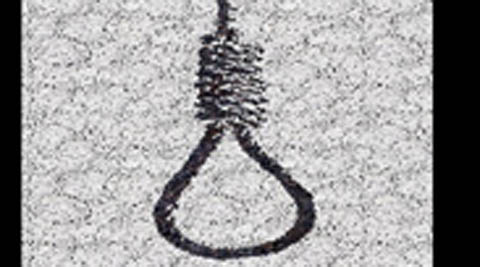 The Maratha community forms the highest percentage of farmers in suicides committed in the last two years in the Marathwada region.
The Maratha community forms the highest percentage of farmers in suicides committed in the last two years in the Marathwada region.
"In the Marathwada region where the Maratha community is kept out of reservation benefits, its percentage in farmer suicides is the highest at 53 percent," said the state affidavit filed in the Bombay high court.
The Bombay high court bench headed by Chief Justice Manjula Chellur is hearing a bunch of petitions, which have challenged the constitutional validity of a July 2014 decision of the state government that provides a 18% reservation for the Maratha community in education and government jobs on the grounds that they were socially and economically backward.
The HC set January 25, 2017 as the deadline for all petitioners and interveners to file their replies to the state affidavit. It posted the matter to January 30 to fix the date of final hearing.The state cited a Gokhale Institute survey report which had done a survey of almost 3,000 suicides by farmers between 2014-16.
The state's 2800-page affidavit with annexures of reports and references to pre-Independence manuscripts and records, says that even in 1820s `Kunbi Marathe' was a term denoted for the caste that included Marathas. The affidavit settled by government pleader Abhinandan Vagyani relies heavily on the Gokhale report and the date it provides, to show that the community has been largely ignored and was suffering the consequences of educational and financial depravity . There is a high percen tage of unemployed persons among the migrants belonging to Maratha and Vanjari community , said the state, "In both the cases, only 30% of them could get employment and 70% remained unemployed. This is serious case of social and economic backwardness. The situation of migrants belonging to Maratha community and other communities is very critical on the count of standard of living, social status, educational status and employment." The state, which is now seeking to vacate a stay imposed by the Bombay high court on the 2014 reservation said "This situation, if prolonged, leads to poverty. Ultimately poverty leads to social, educational and economical backwardness.Such type of backward segment is excluded and deprived of the benefits available to all other well off segments."
The report further states that, all the total 1,300 migrant households interviewed, it was found that in some of the villages, Marathas were high in numbers and in some villages, Vanjaris were more. Therefore, the qualitative analysis of social, economic and educational condition of the caste is presented where the population of these castes is high.
Police arrests 36 for attacking Dalit houses after murder of girl
Mumbai : MMNN:8 Dec. 2016
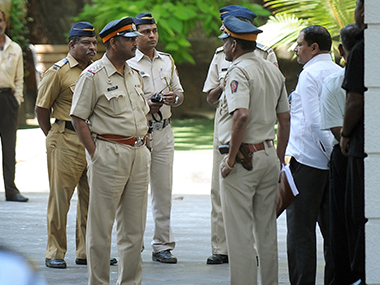 Police in Satara district of western Maharashtra have arrested 36 persons for attacking a Dalit locality following the murder of a girl belonging to the upper-caste Maratha community.
Police in Satara district of western Maharashtra have arrested 36 persons for attacking a Dalit locality following the murder of a girl belonging to the upper-caste Maratha community.
The accused, angry over the killing of the girl last month, targeted the houses and vehicles of Dalits on the outskirts of Korale Khurd village on Tuesday night, police said.
In July, the rape and murder of a Maratha girl at Kopardi in Ahmednagar district had sparked off state-wide protests and mobilisation of Marathas.
Tuesday's incident at Korale Khurd followed the murder of 21-year-old Aruna Mohite, allegedly by her estranged lover Siddharth Dhanane (24), a Dalit, police said.
They were in a relationship for the last few years but her parents forcibly married her off to another person, according to the police.
Dhanane asked her meet him at Thoseghar on 30 November.
During an argument, he allegedly hit her with a stick, killing her on the spot. He then buried the body to destroy evidence, police said.
After a missing persons case was lodged, police found that she was in contact with Dhanane on phone, and questioned him. He allegedly confessed and took the police to the buried body.
Late last night, several members of Maratha community attacked homes of Dalits on the outskirts of the village and torched their vehicles, police said.
Stones were pelted at the houses, window panes of 18 houses were broken and 13 vehicles including three cars were damaged, police said.
"We have arrested 36 persons. We also held meetings of leaders from both communities," said Sandeep Patil, Superintendent of Police, Satara, speaking.
Minor girl gangraped;5 minor students, collegian detained
Nashik:MMNN:5 Dec. 2016
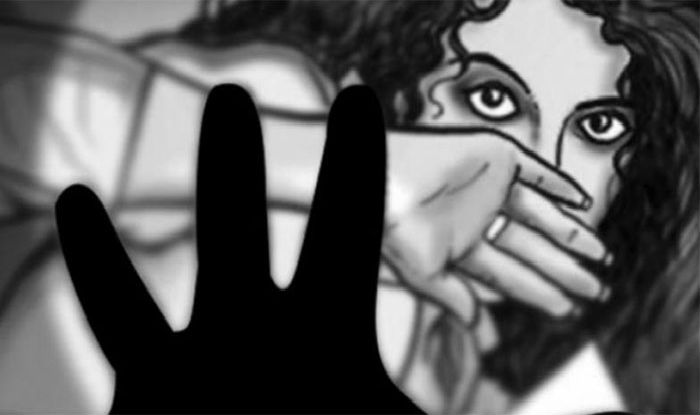 A 13-year-old girl was allegedly gangraped by five minor students and a collegian at Ashwin Nagar here in September, police said today. The victim was taken to a row house by a collegian.
A 13-year-old girl was allegedly gangraped by five minor students and a collegian at Ashwin Nagar here in September, police said today. The victim was taken to a row house by a collegian.
Her cold drink was spiked to render her unconscious, after which the five minor students and the collegian raped her in turns, Deputy Commissioner of Police Shrikant Dhivare said.
They threatened the girl of dire consequences if she revealed anything.
However, the victim informed her mother about the ordeal yesterday, after which the family lodged a complaint with the Ambad police station, said the official. Subsequently, all the accused were detained.
Prima facie, the collegian created a group on a social networking site and included some girl students. He then allegedly started sending obscene messages on the group.
In September, the collegian took the victim to the house where the crime was committed, another police official said.
A case under various sections of IPC and Protection of Children from Sexual Offences Act 2012 (POSCO) was lodged and a probe is underway, he added.
Demonetization discussion in the Maharashtra legislative assembly
Mumbai : MMNN:5 Dec. 2016
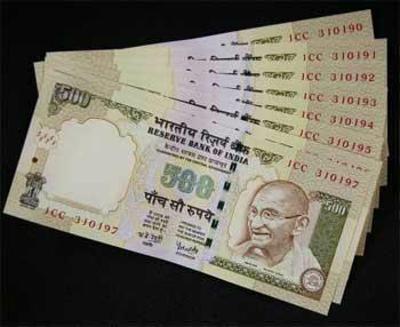 The first day of the Maharashtra winter session began with a debate on demonetization and its severe affect on farmers and rural economy in the state.
The first day of the Maharashtra winter session began with a debate on demonetization and its severe affect on farmers and rural economy in the state.
Opposition slammed the government over its poor implementation in the state. Farm produce prices have crashed and losses worth Rs 20,000 crore have been reported by farmers and small time traders, said leader of the opposition in the Legislative council, Dhananjay Munde.
Senior Congress leader, Narayan Rane said that the cashlessness is hitting the rural economy very hard. Farmers, small time workers and daily wage workers have been massively affected due to the cash crunch.
"To catch one big fish, they have killed the entire pond of small fishes," said Rane.
Meanwhile, opposition in the legislative assembly staged a walkout over the same issue. NCP leader Ajit Pawar said that people who are standing in the line are not people with black money, they are middle class people who are affected by this decision and have no money in their pockets.
Fire in south Mumbai building leads to cylinder blasts, no one injured
Mumbai:MMNN:1 Dec. 2016
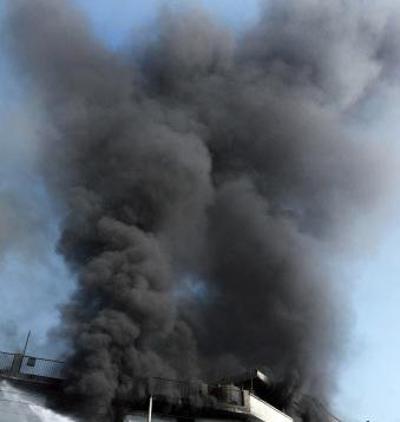 A major fire broke out at South Mumbai's JK Somani building late on Wednesday night leading to three LPG cylinder blasts. While no person has been injured in the incident but the central part of the building is known to have partially collapsed.
A major fire broke out at South Mumbai's JK Somani building late on Wednesday night leading to three LPG cylinder blasts. While no person has been injured in the incident but the central part of the building is known to have partially collapsed.
Around 10 pm on Wednesday the fire brigade received a call about a major fire in the ground plus three storied JK Somani building. While initially eight fire tenders had rushed to the spot later it was increased to 20 fire engines and 12 water tankers being sent.
Fire officials said that the second and third floor of the building was totally engulfed in flames and those in adjacent buildings were being vacated safety. Meanwhile fire officials also realised that cracks were developing in building.
"It being a commercial structure housing offices of advocates mostly not many were present within when the incident took place. While the ground floor of the building is intact the upper floors have been largely damaged, "said a civic official.
Fire fighting and cooling operations thereafter continued till the weekend hours of morning as around 2-3 LPG cylinder blast took place. Making things worse the central part of the building partially collapsed and cracks developed in the involved building.
SK Shrivastava appointed Maharashtra home secretary
Mumbai : MMNN:1 Dec. 2016
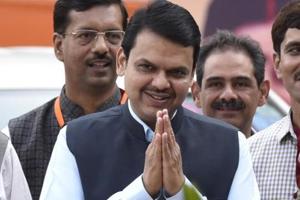 Senior IAS officer Sudhir Kumar Shrivastava is the new home secretary of Maharashtra.
Senior IAS officer Sudhir Kumar Shrivastava is the new home secretary of Maharashtra.
Shrivastava was on Wednesday appointed as additional chief secretary (ACS) of the home department, replacing KP Bakshi, who retires on Wednesday on superannuation. An IAS officer of the 1983 batch, Shrivastava worked in the finance department for more than a decade. He was transferred to the transport department a few months ago, reportedly owing to differences with his bosses. He worked with former union finance minister Yashwant Sinha as his private secretary in the 1990s. In a minor bureaucratic reshuffle, chief minister Devendra Fadnavis also appointed Vijay Satbir Singh as additional chief secretary (health), Sanjay Kumar as additional chief secretary (housing) and Manisha Verma as the women and child development secretary.
State home secretary's post is considered to be the most important one after that of chief secretary of the state.
Sumeet Mallick, UPS Madan and Sudhir Shrivastava are contenders in the race for the post of chief secretary, after Swadheen Kshatriya retires on January 31. It is also believed Shrivastav may be out of the race, as he is unlikely to be transferred again in two months and the decision of his appointment in the home department was taken considering the retirement of the chief secretary. Shrivastava will retire in October 2018.
Manoj Saunik, former managing director of Cottton Growers Marketing Federation, will take over from Shrivastava as the principal secretary of transport and port.
Shrikant Singh has been appointed as the principal secretary in the home department. Sujata Saunik, principal secretary (public health), was transferred to the finance department and will take over from Meeta Rajivlochan, who has been appointed as head of the Rashtriya Ucchastar Shiksha Abhiyaan. Rajivlochan will take over from Manisha Verma. Indra Mallo has been appointed as MD, Mavim and N Nawin Sona as MD, Cotton Growers Marketing Federation.
Bakshi, belonging to the IAS batch of 1982, was appointed as the ACS home on December 31, 2014.
Maharashtra most preferred hiring destination: Survey
Mumbai:MMNN:24 Nov. 2016
 Maharashtra ranks among the top three states in skills related to numerical and logical ability, computer literacy and English language, making it a hiring hotpsot, according to India Hiring Intent survey.
Maharashtra ranks among the top three states in skills related to numerical and logical ability, computer literacy and English language, making it a hiring hotpsot, according to India Hiring Intent survey.
The survey also revealed that Maharashtra is the preferred state for talent acquisition by automobile, banking, financial services and insurance, pharma, hospitality and core sectors like oil and gas, power, steel, minerals and FMCG. It is among the top three states in skills related to numerical and logical ability, computer literacy, and English language along with domain expertise.
This makes it an attractive hiring destination for employers.
There are some other states that have performed exceptionally well in one of the metrics but not in others, it added.
The survey was part of India Skills report, a joint initiative by PeopleStrong, Wheebox and Confederation of Indian Industry (CII), LinkedIn, AIU, AICTE and UNDP.
It was conducted with over 125 employers and 0.5 million candidates from 29 states on various parameters such as skills in English language, domain knowledge, numerical and logical ability and various soft ones like critical thinking, conflict resolution and the like.
In terms of hiring, Maharashtra is only one of the 10 states that have maximum percentage of employable candidates and also features as the most preferred hiring destination by employers across sectors.
"It thus becomes more clear that focus on matchmaking skills with jobs has huge impact. The fourth edition of India Skills Report, 2017, has come up with the new found focus on employability and matchmaking than mere skilling," PeopleStrong Co-founder and CEO Pankaj Bansal said.
Maharashtra state government employees demand salary in cash
Mumbai : MMNN:24 Nov. 2016
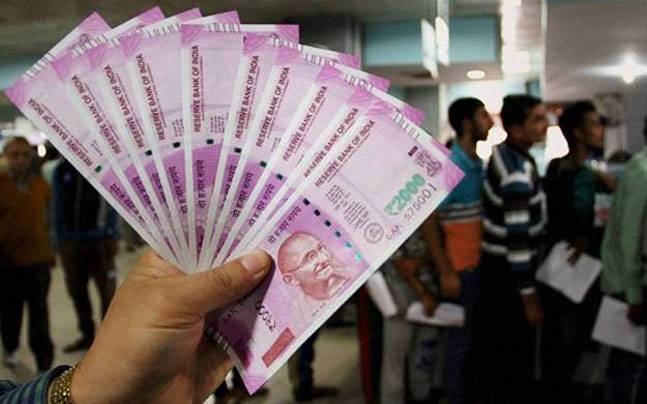 In wake of demonetisation, the Maharashtra State Government Employees Confederation have demanded their salary in cash.
In wake of demonetisation, the Maharashtra State Government Employees Confederation have demanded their salary in cash.
In a letter to the Maharashtra Chief Minister Devendra Fadnavis, the confederation has also asked for the travel allowance in advance in cash for the Nagpur winter session. The winter session of the Maharashtra Legislature is slated to start on December 6.
State government employees travel to the winter capital of the state for the session every year.
THE DEMAND
"Though the decision of demonetisation is good, it has resulted in cash crunch. The state government employees going for Nagpur session are likely to bear the brunt, so to avoid any inconvenience the travel allowance should be paid in cash. Also, the salary for the month of November and December should be paid in cash. It will help mobilise cash in the market and help boost the present economic situation" the letter reads.
Speaking to India Today, Subhash Gangurde, General Secretary of the Maharashtra State Government Employees Central Confederaion said, "Employees will be in Nagpur for the winter session and their families will be here back home. How will they manage their daily expenses Even the employees in Nagpur will have no time to go out and withdraw money. How will they concentrate on their work"
"This decision in a way will also help the government in easing out the present situation. If salaries are paid in cash, it would make a huge sum of cash available in the market and mobilise the economy" added Gangurde.
TOTAL SALARY IS RS 7,500 CRORE
Maharashtra government has around 14 lakh employees all across the state that includes government and semi government employees. The total monthly salary of these employees is approximately Rs 7,500 crores including pension. The Gazetted Officers Association too has supported the demand.
Last week the Union finance ministry had announced that the central government employees in non-gazetted category will get an advance 'part-salary' amounting to Rs 10,000 in cash by November 23.
Sources in the state government told India Today that the State Finance Department too had proposed a similar advance to Grade 3 and 4 employees. The state had then proposed an advance on the same lines upto 3,000-4,000. But citing unavailability of cash chest to store such huge amount, the proposal was shot down by the Chief Secretary.
Maharashtra is high on cybercrime, low on convictions: Only 1 held guilty in 2015
Mumbai:MMNN:21 Nov. 2016
 Maharashtra is among the top states when it comes to cybercrime, but ranks a distant 15th on convictions. In 2014 and 2015, as many as 4,047 cases of cybercrime were registered in the state, but only four convictions could be secured. As compared to this, only 218 cases were registered in Chhattisgarh in the same period, whereas 29 convictions were secured. The statistics has been released by the National Crime Records Bureau (NCRB), as part of its supplementary crime data.
Maharashtra is among the top states when it comes to cybercrime, but ranks a distant 15th on convictions. In 2014 and 2015, as many as 4,047 cases of cybercrime were registered in the state, but only four convictions could be secured. As compared to this, only 218 cases were registered in Chhattisgarh in the same period, whereas 29 convictions were secured. The statistics has been released by the National Crime Records Bureau (NCRB), as part of its supplementary crime data.
It must be noted that convictions in a particular are not necessarily a reflection on cases reported that year, and are usually carry-forwards from previous years. Nevertheless, a low conviction rate is surely a reflection of pendency in courts, and poor communication between investigators and prosecutors.Experts say a shortcoming of the NCRB report is that there is no separate column on acquittals and under-trails.
In the two years under consideration, while three convictions for cybercrime were secured in Maharashtra in 2014, only one conviction was witnessed in 2015--of a senior executive of a private company held guilty of stalking.
The top states when it comes to cybercrime conviction are Uttar Pradesh (120 convictions overall in 2014 and 2015), Chhattisgarh (29), Telangana (26), Punjab (25), Madhya Pradesh (20), Kerala (17) and Rajasthan (13).
Cyber expert Vijay Mukhi says India's cyber deterrence ecosystem is not yet ready to secure convictions. This includes the police at the investigation level and forensic labs for analysing evidence."We then need (adequately equipped) public prosecutors to argue cases in court and finally judges to hear them.This ecosystem is not ready," he says.
"The private sector is not legally allowed to investigate cybercrime. State agencies must be trained internationally to understand how to convict cybercriminals. With demonetisation, we want people to go online for money, but we refuse to make our payment channels cyber-secure.We need to send our cops all over the world to learn how other countries handle cybercrime."
Maharashtra road transport department demands more manpower, digitised tracks
Mumbai : MMNN:21 Nov. 2016
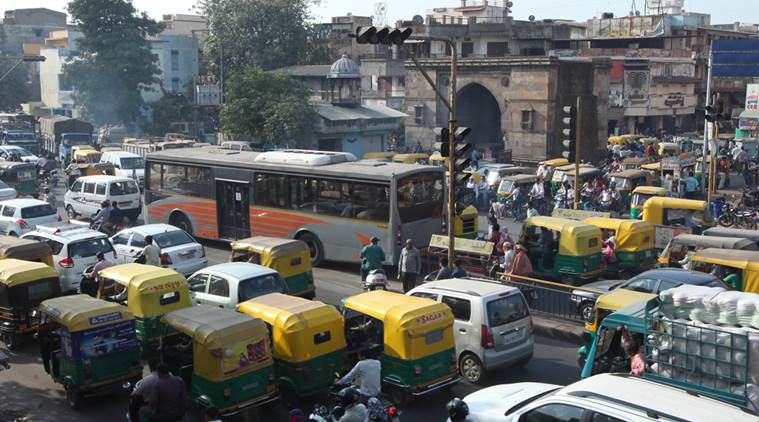 The Maharashtra road transport department has sent its expected list of demands and required costs for improving the transport facilities to the government. Among them, an increase in manpower for various Regional Transport Offices (RTO), replacing manual errors with technology and skill development of officials remain the priority. This comes after the RTOs in the state have been fighting a constant battle of shortage of manpower, lack of offices and upgraded infrastructure since a long time. Earlier in August, the officials were also asked to study the number of manpower, offices, test tracks and computers vis-a-vis the number of vehicles in the state.
The Maharashtra road transport department has sent its expected list of demands and required costs for improving the transport facilities to the government. Among them, an increase in manpower for various Regional Transport Offices (RTO), replacing manual errors with technology and skill development of officials remain the priority. This comes after the RTOs in the state have been fighting a constant battle of shortage of manpower, lack of offices and upgraded infrastructure since a long time. Earlier in August, the officials were also asked to study the number of manpower, offices, test tracks and computers vis-a-vis the number of vehicles in the state.
For the budget 2017-18 set to be announced in February 2017, the road transport department has submitted its list of suggestions to the government that are aimed to work on the loopholes faced by the system, officials said. The demands include a suitable utilisation of funds towards training officers in handling new forms of technology and enhancing their skill.
"We want more budget to be allocated towards training of transport officials so that they could be better skilled in handling upgraded forms of technology which we would try to initiate. We have also called for a requirement of 1,000 transport officers and inspectors to join by next year. Enhancement of their skill will also be our other priority," said a senior transport official.
"Another demand remains to make provisions for digitising hand-written documents and manual records. Pre-2006, each vehicle or licence record that is not available online needs to get digitised. We have also asked for procurement of land so that 13 more RTOs could be set up," he added.
Officials are also looking at introducing computer driving test tracks on the model of Central Institute of Road Transport in Pune across major test centres in the state by next year. A computerised driving test makes use of technology to accredit learning candidates as eligible for getting permits. Requiring minimal manual intervention, officials are particularly focused on utilising maximum land capacity in the city so that such tracks could be set up.
"A digitised driving test track involves the use of video analytics through cameras set up inside the tracks. Through technology-driven results, we will be sure of removing all manual intervention and making sure only drivers of able skill are given a licence. We hope to get more financial allocation for this," a senior transport official said.
The present driving test tracks in Mumbai will not be suitable to adhere to the revised specifications and thus a search for land beyond Vasai, Thane and Kalyan is on to build larger driving tracks, officials said. Building more computerised centres to test the fitness of vehicles also remains another suggestion.
"Inclusion of weigh bridges in flying squads is another suggestion. Weigh bridges consist of four portable weigh pads on which the loading capacity of vehicles can be tested and inform us of a probable overloading of any vehicle. As large scale, vehicles which carry goods more than their capacity are more likely of causing accidents and road damage, this method would aim to take a stringent action against their wrong-doings," an official said.
Widespread use of computerised hand-held terminals, centralisation of electronic challans are other demands on the cards. The road department has already started with the levy of a 'road safety cess' from new vehicle buyers that will be used to update equipment and infrastructure required for road safety.
Helpline receives 36 complaints by patients on payment issues
Mumbai:MMNN:17 Nov. 2016
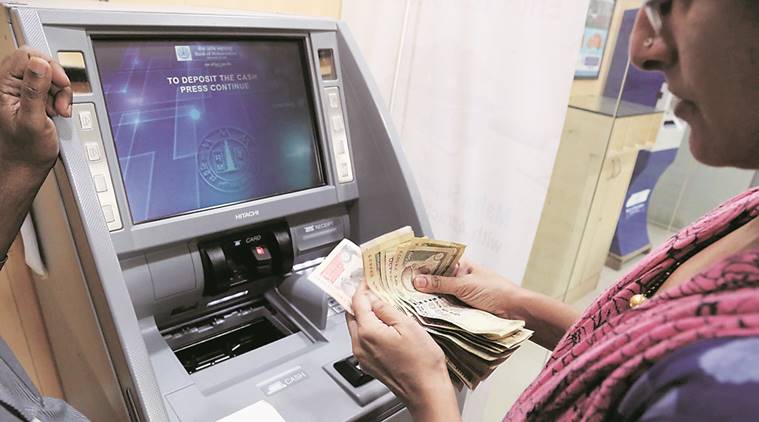 Worried patients are now turning towards the state government for help, following the demonetisation of Rs 500 and Rs 1,000 currency notes that has left them scrambling to make payments for medical care.
Worried patients are now turning towards the state government for help, following the demonetisation of Rs 500 and Rs 1,000 currency notes that has left them scrambling to make payments for medical care.
Across Maharashtra, 173 complaints have been made against hospitals, doctors and nursing homes that have refused to accept notes of Rs 500 and Rs 1,000, or turned away patients offering cheques as a mode of payment.
Mumbai has registered the highest complaints in state in the last three days, with 36 calls made to the toll-free helpline number 108 by the aggrieved patients.
Additionally, 941 calls were made to just inquire what procedures the private hospitals are following for accepting payments from patients.
"We are directing all these calls to respective district civil surgeons. When the state government is intervening, hospitals are accepting cheques," said Dr Satish Pawar, Director of Health Services (DHS).
On Monday, of the 67 complaints resolved by government officials, in only one case did the hospital refuse to cooperate. According to officials, an action will be taken against the hospital.
In Mumbai, confusion has prevailed in all private nursing homes and hospitals. At Dholkawala Maternity Home in Pydhonie, the administration admitted that it has not accepted a single Rs 500 or Rs 1,000
note since November 9. "We received no direct notification from the government to accept it," said an official from the maternity home.
The current state government notification allows private chemists and government hospitals to accept old notes of Rs 500 and Rs 1,000, while instructions have been issued to the private hospitals to now accept cheques in case a patient cannot pay by card or in denomination of Rs 100.
A helpline was started by Health Minister Deepak Sawant on Sunday for the patients who were unable to make payments for medical services.
Mumbai has received 36 complaints since then, followed by Pune with 24 instances of treatment refusal, Solapur with 13 and Nagpur with 12.
According to Rafique Shaikh, a resident at Mohammed Ali Road area, all small nursing homes in South Mumbai continue to refuse cheques and cash in older currency. "These are cases that are going unreported. But patients are forced to ask others for money as most have no ATM card to pay. The problem in hospitals has still not been resolved," he said.
There are however sympathetic doctors who are treating on credit basis. In Goregaon's Guru Nanak Nursing Home, a four-month-old baby was admitted on November 13 for treatment of loose motions.
By Monday, after the father failed to exchange cash, the nursing home discharged the baby allowing the parents to pay in few days.
"There is no option. We need beds for other patients too. We have to work on trust basis," said Dr Sudhir Naik, heading the nursing home.
Following state government's helpline, doctors attached with Association of Medical Professionals (AMP) have also been instructed to
accept cheques and allow a grace period to patients if it bounces back.
No exchange, no sale at vegetable markets: Maharashtra farmers remain cashless and voiceless
Pune: MMNN:17 Nov. 2016
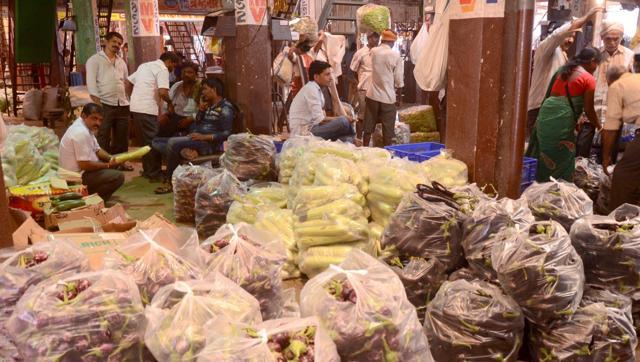 Pune For years, Suhas Gogawale, a farmer from Gogalwadi in Pune district, had a fixed routine - supply vegetables to the mandi (market) in the morning, count the cash by around 10am and then return home. But PM Narendra Modi's decision to demonetize Rs500 and Rs1,000 banknotes has changed it all.
Pune For years, Suhas Gogawale, a farmer from Gogalwadi in Pune district, had a fixed routine - supply vegetables to the mandi (market) in the morning, count the cash by around 10am and then return home. But PM Narendra Modi's decision to demonetize Rs500 and Rs1,000 banknotes has changed it all.
After the announcement, the shortage of smaller denomination currency led to a sharp fall in prices of fruits and vegetables. The traders have now asked farmers to not bring their produce owing to the drop in prices and lack of currency.
"We are stuck in a difficult situation. On the one hand, the vegetable produce in the farm is ready for cutting. But we can't go ahead with it as there is no point taking it to the agriculture produce market committee (APMC). Traders say they don't have the cash to purchase our vegetables," said another farmer Madhukar Gogawale, who produces bitter gourd, tomato and bottle gourd on his 14-acre farm.
With the halt in supply of money from buyers to farmers, the rural economy has taken a hit.
The number of vehicles supplying vegetables to Pune APMC came down by 40% on Tuesday, compared to the previous week, claim sources from the Maharashtra State Agriculture Marketing Board (MSAMB).
The problem, farmers feel, may aggravate further with the district central cooperative banks not being allowed to exchange the higher currency by smaller denominations notes.
These banks, considered to be the backbone of rural economy, have been barred from carrying out transactions, as many of them have not completed the know-your-customer formalities by taking PAN and other details.
In Nashik, many onion growers did not bring their produce to APMCs on Sunday and Monday, as there was not enough cash with traders. Jaydatta Holkar, chairman at APMC, Nashik, said, "We have stopped buying onions for the past two days."
"Our vegetable produce is not getting good price despite demand. Neither can we exchange old currency from the district central cooperative bank, nor can we withdraw money from our accounts. It is a really tough time," said Ramesh Kondhe, another farmer from Khed Shivapur.
Accept cheques for medical emergencies:Maharashtra to pvt hospitals
Mumbai:MMNN:14 Nov. 2016
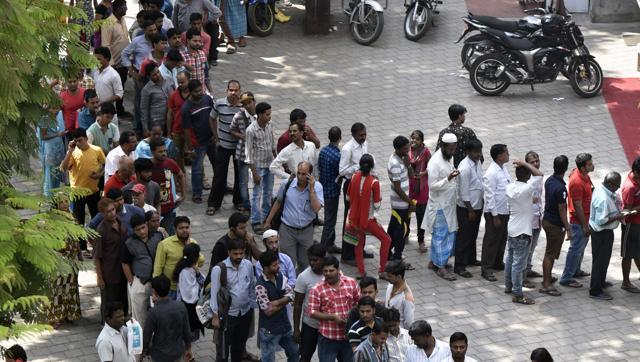 The state government has ordered private hospitals to accept cheques from patients in case of emergencies. The hospitals can face action if the patients are denied treatment for want of cash.
The state government has ordered private hospitals to accept cheques from patients in case of emergencies. The hospitals can face action if the patients are denied treatment for want of cash.
Chief minister Devendra Fadnavis, after a high-level meeting with officials from the health department, said that the government has been keeping a close eye on the situation in private hospitals.
The government has issued directives to all private hospitals to accept cheques from those being admitted in emergencies. The government has also taken the guarantee of up to Rs10,000 each for bounced cheques and said the amount will be refunded from the chief minister's relief fund.
"Officials of the health department are keeping a close watch on the situation. The patients can phone our helpline 108 in case of non co-operation from the hospitals. The patients and their relatives should also phone us with the phone/mobile numbers of the officials of the hospital concerned so that immediate intervention is extended," Fadnavis tweeted on Sunday evening.
The steps were taken after an infant died after a private hospital in Govandi allegedly refused to admit the infant as the parents failed to produce low-denomination currency notes.
After the central government denied permission to Maharashtra government to extend the facility of accepting the demonitised notes till midnight of November 14, the hospitals have stopped accepting them since November 11.
"The directives are only for emergencies in which the patient's life is in danger. The surgeries and treatments, which can wait are not covered under these directives. We have put 108 and 104 helplines operational for the benefit of the patients. Our top-level officials will coordinate with hospital administration if the need be to ensure that no patient in private hospital is left unattended," said Satish Pawar, director of health services.
About the action on the errant hospitals, Pawar, said, "It is implied and reinforced time and again by the Supreme Court that no critical patient be refused treatment for not having money. We have initiated action against the Govandi hospital for refusing to admit the patient and also may also ask the Maharashtra Medical Council for the cancellation of the registration of the doctor concerned. If the need be, action will also be taken against the hospital under the Maharashtra Nursing Home Registration Act," he added.
Elderly, ailing and physically challenged face the brunt after currency demonetisation
Pune: MMNN:14 Nov. 2016
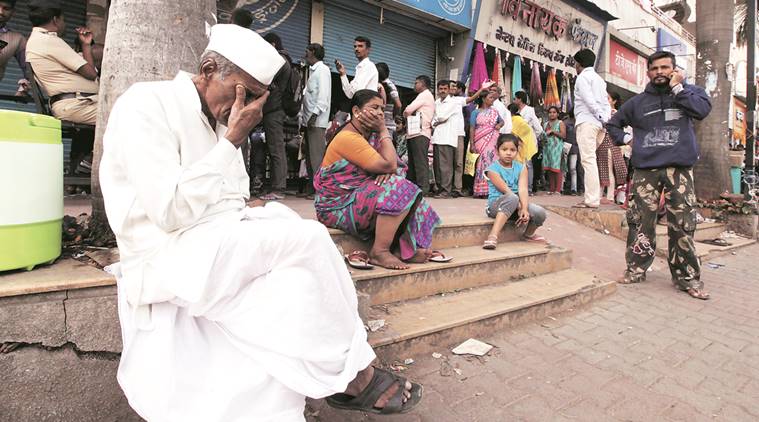 Rafique Khan, 44, a differently-abled resident of Vishrantwadi, spent three hours in the blazing sun before his turn came to withdraw money from the local ICICI branch. "It took me more than five minutes to withdraw the cash as the machine was very slow," he said, adding that nobody cooperated with him, forcing him to jump the queue.
Rafique Khan, 44, a differently-abled resident of Vishrantwadi, spent three hours in the blazing sun before his turn came to withdraw money from the local ICICI branch. "It took me more than five minutes to withdraw the cash as the machine was very slow," he said, adding that nobody cooperated with him, forcing him to jump the queue.
Jayshree Marale, 70, who has been making the rounds of Bank of Maharashtra, Kasarwadi branch, for the past three days, said, "Every time I go there, the queue outside the bank seems unending...The ATM remains shut all the time. I don't know when I will get to withdraw money as our family is fast running out of cash."
Marale is an asthma patient and finds it difficult to stand on the roads due to high-pollution levels.
Subroto Chattopadhyay, a 59-year-old retired government officer, said, "Thinking that the ATMs will be working, I went to the centre early morning but none of the ATM centres were working and I had to visit the bank. But here too, the queue seems unending."
Nilesh R, employed with a private firm, said he had to wait for seven hours and take an off from work just to withdraw cash. Senior citizens, disabled, ailing and the workers seem to have been hit the worst by this cash crunch. People in several parts of the city had to risk their lives as the queues spilled on to roads where vehicles moved in top gear.
While banks claimed that around 70-80 per cent of the ATMs were functional, locals complained that even the few operational ATMs were quickly running dry. Even as the serpentine queues in front of banks continued, bankers claimed that the crowds were much less than the last few days.
Bank of Maharashtra general manager Rajkiran Bhoir said that around 75-80 per cent of the ATMs operated by the bank were operational. "However, the ATMs ran dry quickly as people rushed to withdraw cash," he said.
Over the last few days, Bhoir said, on an average Rs 60-70 crores worth of demonetised notes were changed at the various branches of the bank.
Bankers said ATM functionality was hit as Rs 100 denomination notes were in short supply. It is expected that the Reserve Bank will ensure proper availability of notes of all denomination early next week.
Meanwhile, cooperative banks continued to struggle for want of fresh supply of cash by commercial banks. Smita Deshpande, CEO of Bhagini Nivedita Sahakari Bank, said they had deployed almost all of their staff to handle just customers. "We are not even getting 10 per cent of our demand," she said.
Sanjay Bhatt, manager of Rajarambapu Cooperative Bank, Shivajinagar, said, "We are not entertaining requests from non-customers to change notes. On Saturday, we received Rs 5 lakh which ran out soon. This problem will persist till the RBI succeeds in improving the circulation of the new notes."
At BT Kawade Road area, that houses atleast seven to eight ATM centres, none of the ATMs worked till noon. After 1 pm, some of them started working and soon, a crowd emerged. Long queues were also seen outside banks like Union Bank, Axis Bank, ICICI Bank and Andhra Bank, among others. Likewise, almost 150 people could be seen outside Bank of Maharashtra in Ghorpuri around 10 am.
In Pingle Vasti area on Mundhwa Road some of the ATMs of HDFC, Kotak and Citbank worked early morning. However, they too ran out of cash by around 8 am. "I went around 7 am and was able to withdraw cash. But my neighbour, who visited the ATM after 8 am, couldn't find any operational ATM," said Diksha Menon, a homemaker.
Though troubled like most commoners, Sridhar Moorthy, a resident of Pingle Vasti, said, "I feel that we all are fighting for a bigger cause - curbing black money. We need to support our government and bear with the short term inconvenience with patience."
The ATMs in Audh, Baner and Pashan remained open only for a few hours while displaying the "cash not available" sign for the rest of the day on Sunday.
Donations to temples, FDs in co-op banks in Maharashtra under government scanner
Mumbai:MMNN:10 Nov. 2016
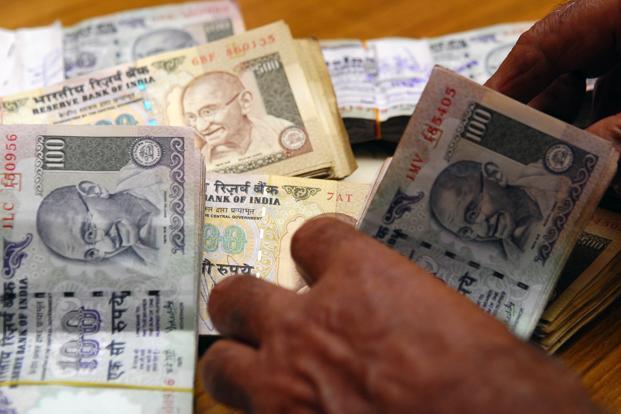 Hurried donations made to nearly 100 temples and trusts and sudden spurt in cash reserves in nearly 1,000 cooperative banks and credit societies in Maharashtra after government's decision to scrap Rs500 and Rs1,000 notes have come under government's scanner, a state senior minister said on Thursday.
Hurried donations made to nearly 100 temples and trusts and sudden spurt in cash reserves in nearly 1,000 cooperative banks and credit societies in Maharashtra after government's decision to scrap Rs500 and Rs1,000 notes have come under government's scanner, a state senior minister said on Thursday.
"The suspicious part of the whole rush for temple donations and opening six deposit accounts is that they were triggered immediately after Prime Minister Narendra Modi made the announcement of demonetising currency notes of Rs1,000 and Rs500 denomination," the minister said.
The minister, who did not wish to be named, said officials have apprised the state government that there has been a surge in donations to temples immediately after the announcement. "Some people have tried to secure their unaccounted cash by donating it to temples by taking its management into confidence and making receipt of such donations as anonymous donors," he said.
A similar pattern was applied in some cooperative banks that are associated or directly controlled by politicians, he said. "Some people having unaccounted cash in lakhs of rupees have managed to secure receipts for opening of fixed deposit account. It was possible because these (cooperative) banks operate locally with handful of branches and cater to local banking needs," the minister said. "In such cases, the unaccounted cash will turn into white money, if people manage to produce all valid documents. We have asked officials from departments concerned to keep a tab on any suspicious transaction, donations or deals," he said.
"In most of these banks, works, including issuing receipts, is done manually. As a result, some people managed to get the date of opening of the fixed deposit (FD) account, as prior to the prime minister's announcement. To counter such frauds, government will check the unnatural rise in the cash reserves in these banks. They will be under scanner," the minister added.
Such fraudulent transactions have taken place in over 100 temples and trusts in Maharashtra, he said, adding, action will be initiated against those guilty of colluding with the fraudsters.
The government will also monitor the sudden spurt in cash reserves in the nearly 1,000 cooperative banks and credit societies in Maharashtra. Some temple managements are "close to political parties, making such transactions possible," he alleged.
Don't panic, says Maharashtra Finance Minsiter
Mumbai: MMNN:10 Nov. 2016
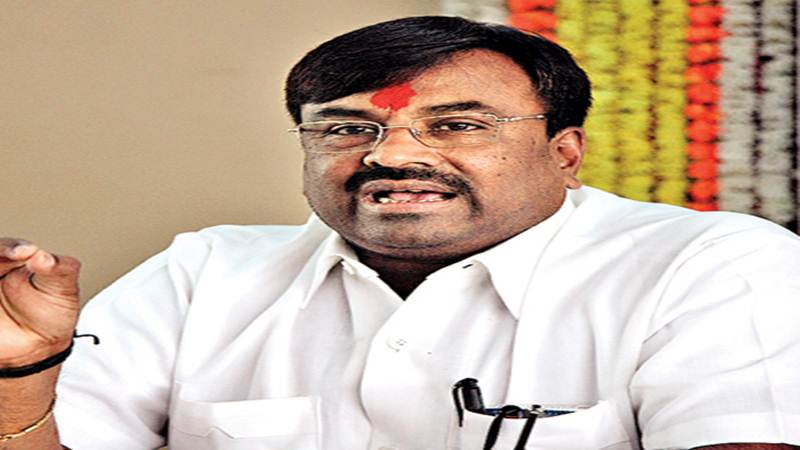 Maharashtra Finance Minister Sudhir Mungantiwar on Wednesday urged people not to panic in the wake of demonetisation of old Rs 500 and Rs 1,000 notes as the state government has made elaborate arrangements for their exchange at bank branches.
Maharashtra Finance Minister Sudhir Mungantiwar on Wednesday urged people not to panic in the wake of demonetisation of old Rs 500 and Rs 1,000 notes as the state government has made elaborate arrangements for their exchange at bank branches.
Mungantiwar said that besides nationalised and private banks, state government has asked its central district cooperative banks and district cooperative banks to accept the old demonetised currency notes.
He also said the government has asked Maharashtra Director General of Police (DGP) Satish Mathur to deploy police personnel at banks to deal with law and order situation.
"The government will also depute its Revenue Department officials at banks to assist them and the people in filling up the currency notes exchange forms," he told reporters here.
Commenting on the problems being faced by people, Mungantiwar said the government will intervene if required.
He clarified that there is no restriction imposed on the amount of money people can deposit in their bank accounts.
He said that the Reserve Bank of India (RBI) has deputed three nodal officers and three cash vans per division to ensure smooth transporting of currency notes to banks.
Mungantiwar said there is adequate stock of Rs 100, Rs 50, Rs 20 and Rs 10 denomination notes for the next five days.
He said while depositing old demonetised currency notes, one has to fill up a small form and will have to attach copy of any proof of identity like Aadhar Card, passport or PAN card.
Maharashtra to bring 40 lakh more hectares under irrigation
Mumbai:MMNN:7 Nov. 2016
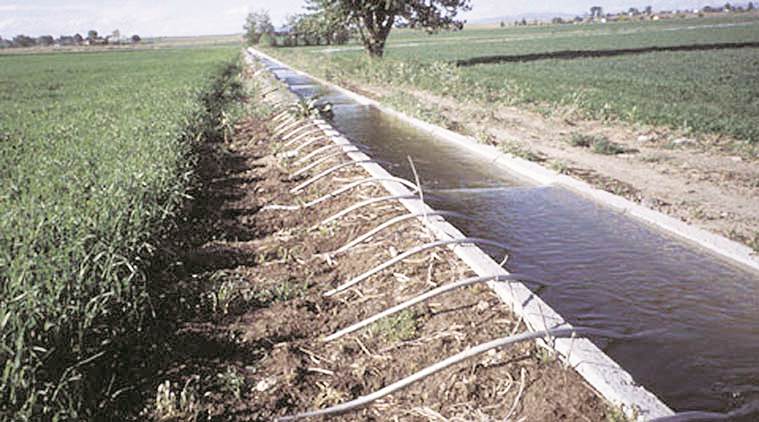 THE Maharashtra government has drawn plans to bring additional 40 lakh hectares of land under irrigation, availing 83.3 per cent of the water storage in 3,037 dams across the state. The ambitious target aims to enhance the state's irrigation potential, which has remained stagnant at 18 per cent for the last 15 years. The target for 2016-17 is being backed with the Vision Document and policy reforms in water management and changes in the crop pattern. Highly placed sources in the Ministry of Water Resources said the highest record of maximum land under irrigation in one year was 32 lakh hectares in the year 2005. "We can easily bring additional 40 lakh hectares under the command area of irrigation if our plans are properly implemented," said a source.
THE Maharashtra government has drawn plans to bring additional 40 lakh hectares of land under irrigation, availing 83.3 per cent of the water storage in 3,037 dams across the state. The ambitious target aims to enhance the state's irrigation potential, which has remained stagnant at 18 per cent for the last 15 years. The target for 2016-17 is being backed with the Vision Document and policy reforms in water management and changes in the crop pattern. Highly placed sources in the Ministry of Water Resources said the highest record of maximum land under irrigation in one year was 32 lakh hectares in the year 2005. "We can easily bring additional 40 lakh hectares under the command area of irrigation if our plans are properly implemented," said a source.
It has been decided to make water meters compulsory to regulate the use of water drawn from dams for commercial use. Any civic body found violating the norms and lifting water above the given quota from dams for commercial purposes would be slapped high penalty - up to one and a half times more than the water tariff per unit.
A study has shown that water quota for commercial purpose has been regularly violated, with illegal lifting of water from dams and diversion from the quota allocated for the purpose of drinking and agriculture becoming "a regular phenomenon". A senior officer said, "The metering of dam water would help in curtailing water wastage up to 30 per cent. It would also help generate higher revenue from the existing Rs 650 crore to Rs 1,400 crore annually."
Chief Minister Devendra Fadnavis has urged the Ministry of Water Resources and the Ministry of Agriculture to prepare a roadmap complete with water availability and crop patterns. The mammoth exercise is part of the policy decision to shift from rain-fed agriculture to water management agriculture. The thrust on crop pattern is to ensure farmers don't go for sugarcane cultivation citing plenty of water in the dams and reservoirs, leading to crises in summers.
Along with making drip irrigation mandatory for high water-intensive crops like sugarcane, the crop rotation will also be planned region wise following a water audit. Focus is also on minimising the water losses from dams due to poor maintenance of canals and water structures, including missing gates at Kolhapuri-type weirs (bridge-cum-barrages).
"Time has come to treat the water as essential commodity. After four years of consecutive drought, Maharashtra has received abundant rains. We have to encash the good monsoons to bring prosperity to farmers across the state," Fadnavis has said in meetings with ministry officials. Water Resources Minister Girish Mahajan has convened a series of meetings between November 8 and 15.
Of the 96 mega projects divided over four sections with command area of more than 1 lakh hectares, all medium projects and those on less than 1 lakh hectares would be personally reviewed by the minister. The water resources department's demand for higher allocation of funds for irrigation infrastructure and maintenance of the existing structures are also under consideration of the finance ministry.
German Bakery case: Maharashtra govt moves Supreme Court against Baig acquittal
Pune :MMNN:7 Nov. 2016
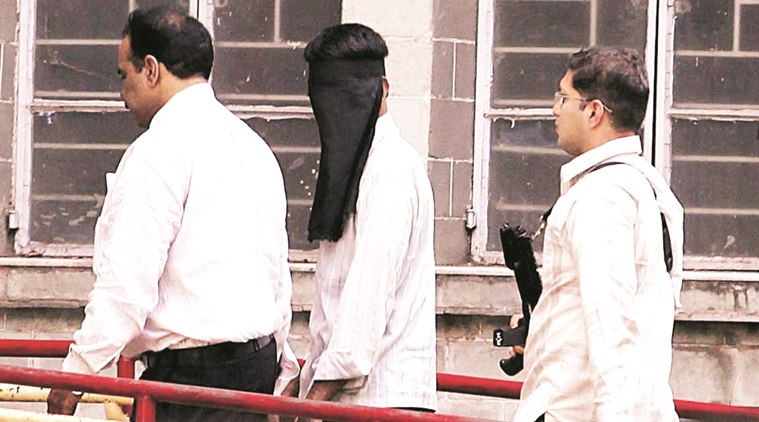 THE STATE government has moved the Supreme Court against the acquittal of Mirza Himayat Baig on five counts of death and four counts of life imprisonment that was handed out to him by a trial court in Pune for his alleged involvement in the German Bakery bombing in February 2010.
THE STATE government has moved the Supreme Court against the acquittal of Mirza Himayat Baig on five counts of death and four counts of life imprisonment that was handed out to him by a trial court in Pune for his alleged involvement in the German Bakery bombing in February 2010.
Baig, the lone accused in the case who was awarded death penalty by a Sessions Court in April 2013, was in March this year sentenced for life instead by the Bombay High Court which convicted him for "possession of explosives."
Challenging the HC order, government lawyer Nishant R Katneshwarkar has now moved the SC, citing 20 grounds. The petition has challenged the March 17, 2016, judgement which had also acquitted Baig from charges under various Sections of the Unlawful Prevention (Activities) Act and the IPC, including Sections 302 (murder) read with 120-B (criminal conspiracy).
"The HC overlooked the evidence which showed that Baig had travelled from Latur to Mumbai and stayed at a lodge for the purpose of entering into a conspiracy or for giving final shape to terrorist act or in furtherance of his terrorist activities," says the petition.
Meanwhile, Baig had submitted a Special Leave Application seeking "complete acquittal" by challenging the conviction on the two charges levied by the HC.
"The evidence produced to support Baig's involvement is flimsy. The Maharashtra Anti-Terrorism Squad (ATS) says that the autorickshaw driver who had dropped Baig and (Yasin) Bhatkal to Koregaon Park identified Baig several months after the incident. This is not reliable evidence and looks concocted to frame my client. The explosive sample from the blast site doesn't match with the RDX that the ATS alleges was seized from Baig's residence. We are confident of the acquittal on the two charges," Baig's lawyer Farrukh Rasheed said in the application. The SC is likely to hear the case later this month.
Maharashtra to become first state to launch cyber police stations in all districts
Mumbai:MMNN:3 Nov. 2016
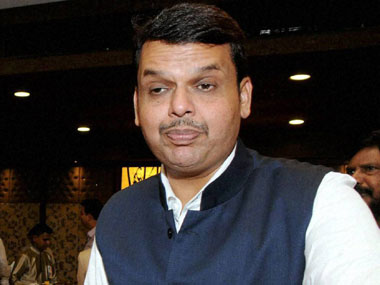 Maharashtra is converting 42 state-of-the-art cyber crime labs into cyber police stations, as part of the BJP-led government's strategy to take on cyber criminals.
Maharashtra is converting 42 state-of-the-art cyber crime labs into cyber police stations, as part of the BJP-led government's strategy to take on cyber criminals.
"Maharashtra is the first state in the country which will have a cyber police station in each district simultaneously," a top Home Department official told .
Cyber crime in Maharashtra has risen by a whopping 142.1 percent in the last few years, the official said.
These cyber police stations will also be set up at police commissionerate and Range IG offices.
The Devendra Fadnavis-led government, which completed two years recently, will soon issue a notification in this regard, the senior IPS official said.
Fadnavis had inaugurated 34 well-equipped cyber labs in all districts, on the Independence Day this year.
The state government's cyber crime wing is setting up 51 cyber crime labs in Maharashtra. These include the 34 labs at the district level, seven at Inspector General's offices, nine at Commissioner of Police offices and one lab at the state police headquarters, the official said.
Maharashtra is facing increased cyber crime cases in tier-II cities and also in rural areas, the official said. Many such cases remain pending for investigation and the new initiative will take care of this shortcoming, he said.
For the normal local police stations, tackling cyber crimes is a daunting task owing to lack of proper training and technical knowledge. However, the cyber labs come with trained manpower and modern equipment to deal with the new-age crimes in the cyber world, the official said.
With this new initiative, any offence related to cyber crime will be registered in these police stations at the district level. Additional cyber police stations will also be set up in some cities, the official said.
While 907 cases of cyber crime were registered in 2013, as many as 2,195 such cases were filed in 2015. There was conviction in just five of the 4,981 cases filed in three years, the official added.
Maharashtra government yet to issue licences to three dance bars
MUMBAI:MMNN:3 Nov. 2016
 Despite the Supreme Court issuing specific orders to the state on September 21, telling it to issue licenses to three dance bars so they can operate according to the old rules, the state government has not yet decided on how to implement this. The home department has asked the law and justice department how to go about this.
Despite the Supreme Court issuing specific orders to the state on September 21, telling it to issue licenses to three dance bars so they can operate according to the old rules, the state government has not yet decided on how to implement this. The home department has asked the law and justice department how to go about this.
The Apex Court had asked the state government to issue licences to the three dance bars - Indiana in Vidyavihar, Classic and LP in Andheri - under the old rules, before the stringent Maharashtra Prohibition of Obscene Dance in Hotels, Restaurants and Bar Rooms and Protection of Dignity of Women (working therein) Act was passed by the Maharashtra government in April. The home department was confused whether to issue licences under the old rules which were repealed while passing the new act. However, the new act was not stayed by the Supreme Court.
Before the state passed the act, the government had framed 26 rules regulating operations in dance bars. The new act, followed by 36 stringent rules, banned liquor in bars, restricted timings to 11.30pm and mandated that the bars maintain a distance of 1km from religious places and educational institutions. The bar owners, in two different cases, challenged old amendments as well as the new act.
"We have not received fresh applications by the bar operators seeking permission to operate. When the court says the licences must be issued according to the old rules, it has neither stayed the new rules nor complied with the old rules when licences have been applied for in the past. We have asked the law and judiciary department for its legal opinion before taking any steps," said an official from the home department.
The official expressed apprehension over bar owners moving the Apex Court with a contempt petition against the government for not implementing the order.
Bar owners said they were prepared to apprise the court about the state's failure to implement the orders. "When we asked authorities at the Mumbai police commissionerate, we were told that the government has not decided the means of implementing the order. The next hearings are on November 15 and November 24. We are planning to apprise the court of the state's failure to implement the order," said Bharat Thakur, president, dance bar cell of Ahar. Dance Bars
"The licences are to be issued by the police. I am not aware of the current status," said Dr Vijay Satbir Sing, additional chief secretary, home.
The state has decided to submit a fresh affidavit defending its stringent rules framed under the new law. "The court kept the petition for final disposal on November 24. We have decided to submit a fresh affidavit defending all our 37 conditions including distance, ban on liquor and timings. We are confident that the new act will be upheld by the Supreme Court," another official said.
Maharashtra govt to go paperless ahead of Winter Session
Mumbai:MMNN:27 Oct. 2016
 The Maharashtra government has to give a go-ahead for procurement of tablets for paperless functioning of the state Legislature.
The Maharashtra government has to give a go-ahead for procurement of tablets for paperless functioning of the state Legislature.
With this move, the upcoming session of the Legislature to be held in Nagpur from 5 December, will go paperless.
The committee set up for procurement of tablets has given a go-ahead for it along with financial sanction, MLC Manikrao Thakre, one of the committee members, told PTI on Thursday.
States like Goa and Haryana are already using tablets during sessions of their respective Legislative Assembly, he added.
"The tablets are going to be used in the upcoming Winter Session. The Maharashtra government spends around Rs 50 crore annually for publication of various committee reports, official surveys, reference reports and daily reports for the members of Assembly and Council.
Compared to it, at present the tablet cost is not over Rs five crore. Once the tablets are procured, the cost of (publishing) documents will be saved forever," Thakre said.
There are 288 members in the Maharashtra Legislative Assembly while there are 78 members in the state Legislative Council.
"The high speed Internet service will reduce the waste of time in searching the information and presenting it before the House", Thakre, a senior Congress leader said, adding the government needs to ensure higher Internet speed through Wi-Fi service.
"All the modalities including whether to fix the tables inside the both houses will be finalised at the Committee meeting after Diwali," Thakre added.
A committee of administrative officers had already studied the functioning of Haryana and Goa Assemblies and hence the state government gave its nod to the proposal, said the MLC.
The Budget and the Monsoon session of the Maharashtra Legislature are held in Mumbai while the Winter session is held in Nagpur.
Maharashtra approves 118km Metro routes to connect suburbs
MUMBAI:MMNN:27 Oct. 2016
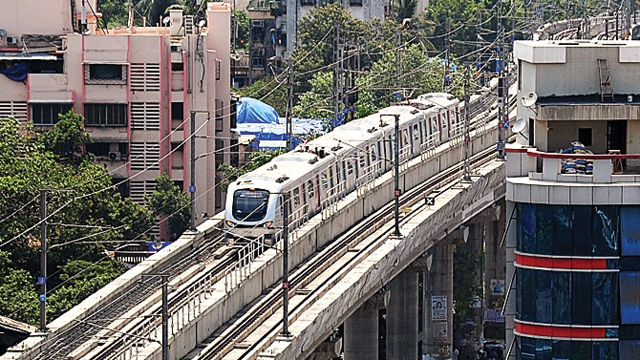 The Maharashtra Urban Development (UD) Department has approved 118km of Metro lines, which will connect various parts of the Mumbai suburbs. The move is aimed to ease traffic congestion.
The Maharashtra Urban Development (UD) Department has approved 118km of Metro lines, which will connect various parts of the Mumbai suburbs. The move is aimed to ease traffic congestion.
According to the department notification, the government has approved following lines: Dahisar-DN Nagar (27km), Bandra-Mankhurd (13km), Wadala-Ghatkopar-Thane-Kasarwadavali (22km), Wadala-RA Kidwai Marg (8km), Dahisar (E)-Andheri (E) (18km), Andheri (E)-Bandra (E) (9km) and Jogeshwari-Vikroli Link road (11km).
The Mumbai Metropolitan Region Development Authority (MMRDA) will undertake this work, while the Delhi Metro Rail Corporation (DMRC) will work as an advisory for the finalised Metro routes. The estimated cost for the Metro-II route (Dahisar-Charkop-Bandra-Mankhurd) is Rs10,986 crore, while Metro-IV route (Wadala-Ghatkopar-Mulund-Thane-Kasarvadavli) will cost an estimated cost Rs14,549 crore.
The Government has also approved the decision of raising loans for these approved Metro lines from the Asian Development Bank (ADB). In addition, MMRDA can also take loans from the World Bank or any other internationally approved bank. The Government will not take any responsibility of repaying the loan.
Moreover, the Government and semi-Government agencies will have to rent the land under them to the MMRDA for development of the Metro lines, at a reasonable rate. If it requires to acquire the land permanently, the acquisition will be done as per the new Land Acquisition Act, 2013.
A senior UD official said the Maharashtra Government has declared Metro an important and urgent project, so that various approvals required from the Central and Western Railways could be sought on an urgent basis.
"The Metro project has to be completed within the stipulated time. The State Government will provide power for the project at a reasonable rate. The Government has also decided to have an integrated transport system," added the official, requesting anonymity.
He further said that during the development of these Metro lines, innovative traffic diversion will be done. "People should not suffer because of the project. We will sit with the traffic department officials and do innovative traffic diversion, so that the Metro work can carry on smoothly," he said.
Foreign investors pursued to set up units in Maharashtra
Mumbai:MMNN:24 Oct. 2016
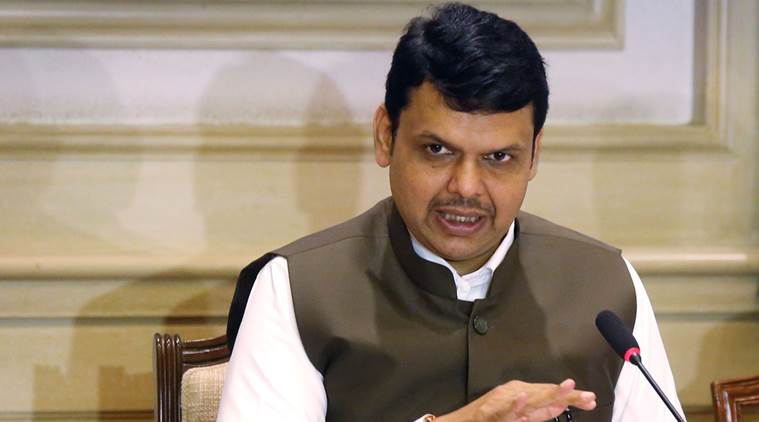 Fadnavis discussed policy reforms undertaken by his government in the last two years for ease of doing business including a drastic cut in permit regime. The permissions required have come down from 78 to 25.
Fadnavis discussed policy reforms undertaken by his government in the last two years for ease of doing business including a drastic cut in permit regime. The permissions required have come down from 78 to 25.
Promising all support from the government to investors, Fadnavis indicated they could have their units anywhere in Maharashtra. This would help in long-term business and greater collaboration and public participation. He said that Maharashtra's market potential should mutually benefit both, and its dividends help in welfare of people in the state.
A senior officer, part of the discussion with foreign delegations to promote Make In Maharashtra, told The Indian Express, "The state has undertaken major policy corrections in approach to overseas investments in the state. Now, at every meeting, Fadnavis outlines the intent clearly emphasising on making investors create assets through manufacturing and infrastructure for development of the state and creating local employment."
The first execution of the changed policy translated into reality at Nagpur, where a Chinese company has agreed to set up a metro coach manufacturing unit at Mihan. The China Railway Rolling Stock Corporation (CRRC), a Chinese government firm, last fortnight decided to invest Rs 1500 crore and set up its manufacturing unit in the multi-modal International Cargo Hub and Airport at Nagpur.
Putting the pre-condition with overseas investors to contribute to long-term partnership in building assets is to ensure they don't look at Maharashtra as a mere market to park products and earn returns. Another reason for such pre-conditions stems from wooing overseas investors to explore beyond the Mumbai-Pune-Nashik corridors.
Two weeks ago, CISCO CEO Chuck Robbins announced to build and expand its manufacturing unit in Pune and made a commitment for partnership with state government's ambitious digital India projects to provide healthcare and quality education in 29,000 gram panchayats in Maharashtra.
Apart from holding talks with four foreign delegations in Maharashtra, the CM has travelled to Israel, Japan, United States, China, Russia and Switzerland to woo investors. The economic survey released by the centre mentioned 40 per cent boost in foreign direct investment because of Make In India drive. The Make In India Week (February 13-18) saw a cumulative investment projection of Rs 15 lakh crore for the entire country. Of this, Maharashtra alone bagged Rs 8.04 lakh crore.
ADHM row: Shabana Azmi slams Maharashtra CM for 'brokering deal'
MUMBAI:MMNN:24 Oct. 2016
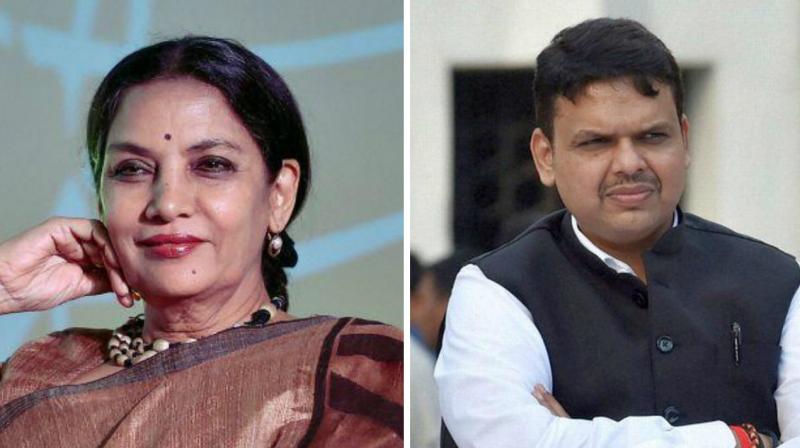 After facing uncertainty over its release for the past few weeks, Karan Johar's 'Ae Dil Hai Mushkil' is all set to release on its scheduled release date of October 28.
After facing uncertainty over its release for the past few weeks, Karan Johar's 'Ae Dil Hai Mushkil' is all set to release on its scheduled release date of October 28.
Raj Thackeray's political party Maharashtra Navnirman Sena had opposed the release for featuring a Pakistani actor Fawad Khan in it, but the party finally relented when Karan Johar along with Producers Guild President Mukesh Bhatt met Maharashtra Chief Minister Devendra Fadnavis at his residence along with Thackeray and the producers of the film.
The party put forth demands that a mention paying tribute to the martyrs of the attacks in Uri would be shown at the start of the film, and that any producer casting a Pakistani actor in the film should pay Rs. 5 crores to the Army Welfare Fund.
This demand to pay 5 crores has not gone down well with several Bollywood celebrities, some of them terming it as 'extortion'.
Shabana Azmi, too, took to Twitter expressing her unhappiness over the demand and even slammed Fadnavis for 'brokering the deal' between the makers of 'Ae Dil Hai Mushkil' and Thackeray, and for showing scant regard for Home Minister Rajnath Singh's assurance of a safe release for the film.
Maharashtra Governor clears amendment to Cooperative Societies Act
Mumbai:MMNN:20 Oct. 2016
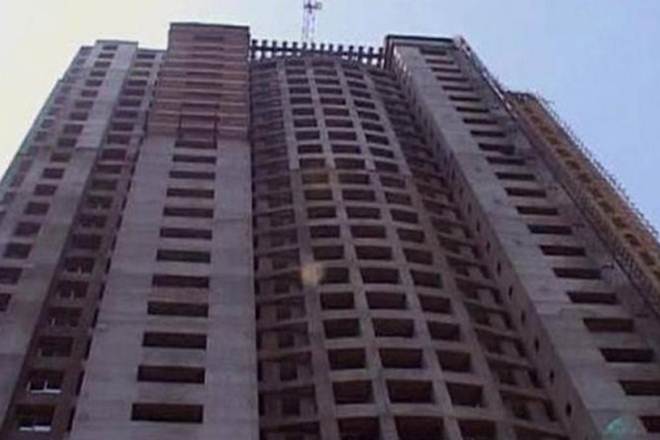 Maharashtra Governor C Vidyasagar Rao has signed the state government's controversial ordinance seeking to amend the Maharashtra Cooperative Societies Act, 1960.
Maharashtra Governor C Vidyasagar Rao has signed the state government's controversial ordinance seeking to amend the Maharashtra Cooperative Societies Act, 1960.
The ordinance bars directors of mismanaged cooperative banks from contesting bank elections for two consecutive terms.
"As a result of this, the earlier ordinance, which was extended twice since January has been withdrawn," state Cooperation Minister Subhash Deshmukh told, today.
"The amendment in the Maharashtra Co-operative Societies Act, 1960 is now official and it has come into effect immediately. The state government will soon issue instructions to Regional Cooperatives Officers in this regard," he said.
The Act is set to hit NCP as well as Congress as many of its leaders have been members and chairmen of various cooperative societies, including the district central cooperative banks.
According to RBI's directions, directors should be barred from re-contesting elections for two terms.
The amendment will also be applicable in retrospective effect for all cases, where the board has been dissolved in line with the Central bank's guidelines for the past ten years, Deshmukh added.
Maharashtra govt approves 2 Metro projects worth Rs 15,088 crore
MUMBAI:MMNN:20 Oct. 2016
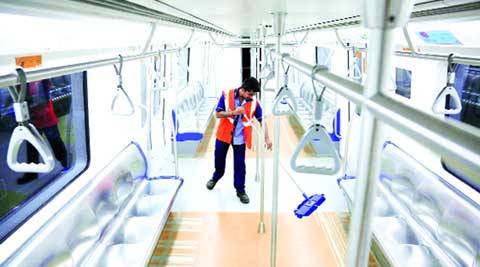 THE MAHARASHTRA government on Wednesday approved two major Metro projects -Thane-Bhiwandi-Kalyan Metro 5 and Swami Samarth (Lokhandwala)-Jogeshwari-Vikhroli-Kanjurmarg Metro 6 corridors, worth Rs 15,088 crore.
THE MAHARASHTRA government on Wednesday approved two major Metro projects -Thane-Bhiwandi-Kalyan Metro 5 and Swami Samarth (Lokhandwala)-Jogeshwari-Vikhroli-Kanjurmarg Metro 6 corridors, worth Rs 15,088 crore.
Chief Minister Fadnavis said, "Maximum Mumbai is now completely on Metro network with all the projects which were planned given the consent and ready to roll. The total worth of all the eight corridors in process in various stages, which will cover 172 kms across Mumbai, works out to Rs two lakh crore."
There are just two missing links. A feasibility study is underway and they would be soon incorporated in the Metro circuit, according to Fadnavis.
Thane-Bhiwandi-Kalyan Metro 5 which will be a 24-km stretch will have 17 stations. These include Kalyan station, APMC, Sahajanand Chowk, Durgadi Fort, Kon Goan, Gove Gaon, MIDC, Rajnouli Village, Temghar, Gopal Nagar, Bhiwandi, Dhamankar Naka, Anjur Phata, Purna, Kalher, Kasheli, Balkumbh Naka and Kapurbawdi.
The 14.5 km Swami Samarth (Lokhandwala)-JVLR-Kanjurmarg Metro will have 13 stations, Lokhanwala Complex, Adarsh Nagar, Momin Nagar, JVLR, Shyam Nagar, Maha Kali caves, SEEPZ village, Saki Vihar Road, Ram Baug, Powai Lake, IIT Powai, Kanjurmarg (W), Vikhroli-Eastern Express Highway.
While launching a special Metro logo designed by students of JJ School of Arts, the chief minister said, "Mumbai is now a 'metro' in the real sense of the term. Mumbaikars will find travel both comfortable and time saving." The Metro network is expected to help ease congestion in local trains which are often overcrowded, specially during peak hours.
While reiterating that fast tracking of these projects will not be compromised, he said, "In the past it took eight years to go ahead with ten km of metro. Whereas, in two years we have set the process rolling for the entire 172 km."
Two other projects sanctioned at the meeting are, 500 wi-fi spots in Mumbai and widening of rail over bridge at Kopri. The government will set up 1200 wi-fi hot spots across Mumbai.
In the first project, the government has approved Rs 194 crore for 500 wi-fi hot spots, which will be identified by the Maharashtra Information and Technology Corporation.
The Rs 259 crore project to widen the Rail Over Bridge at Kopri, Thane (East) is to decongest and streamline traffic. The existing two plus two lane bridge will give way to a new four plus four lane bridge with service roads.
According to MMRDA commissioner UPS Madan, "The projects are moving as per plan. We will have to acquire 15 hectares of land for each of the three depots. The issues related to utilities and other aspects will have to be worked out."
Deadly chemicals mixed with toddy across Maharashtra, reveals excise department survey
Mumbai:MMNN:13 Oct. 2016
 ABOUT ONE in five toddy depots are selling a deadly cocktail of chemicals in the name of toddy in Maharashtra's urban belt, a survey by Maharashtra government's excise department has found.
ABOUT ONE in five toddy depots are selling a deadly cocktail of chemicals in the name of toddy in Maharashtra's urban belt, a survey by Maharashtra government's excise department has found.
The survey found massive quantities of chemicals such as chloral hydrate and alprazolam in toddy sold by depots in urban areas such as Mumbai, Pune, Solapur, and Nanded, among others.
Startled by the revelation, the Maharashtra government has decided to ban toddy sales in areas that do not grow toddy.
State Excise Minister Chandrasekhar Bawankule told The Indian Express that the government will ban the supply and sale of toddy in areas that do not grow toddy. "A policy for this prohibition will soon be brought before the state cabinet. It is necessary to take this step to prevent the sale of adulterated toddy in the state, which was found to be rampant," he said.
A two-day drive conducted by the department starting September 24 unearthed the net of adulteration. "We provided a special kit to our inspector for detecting adulterated toddy. The findings were startling," said Excise Commissioner V Radha.
One in every five toddy depots in the financial capital was found selling toddy laced with the deadly chemicals. A similar trend was observed in Pune, Solapur, Nanded, and other cities.
While the adulterators mixed the chemicals to give sedative or muscle-relaxing effect to the consumers, senior department officials said that the deadly cocktail can result in withdrawal symptoms among addicts. In neighbouring Telangana where a similar racket was previously unearthed, some deaths were also reported owing to the adulteration.
Bawankule said the government's new policy will be to permit liquor shops only in talukas where toddy can be tapped.
Toddy trees are primarily found in the Sindhurdurg, Ratnagiri, and Palghar districts in the Konkan belt. There are also some toddy-growing talukas in Western Maharashtra's Sangli, Solapur, Pune, and Marathwada's Nanded.
The existing policy permits toddy tappers from a particular taluka to open up shops in other areas in the district. Bawankule said the new policy will prohibit this. "They will have to remain within the same taluka to ensure that only natural toddy is served," the minister said. In Mumbai, where there is no toddy cultivation, the sale of toddy will now be virtually banned. Out of 1,250 toddy shops across the state, about 250 exist in Mumbai. They will now be shut down, said officials. Under the new policy, one toddy shop will be permitted for 1,000 toddy trees, said Bawankule.
The department estimates the new prohibition will result in 65-70 per cent of toddy depots across the state shutting down. Monetarily speaking, the state's income from toddy sales will drop sharply - from the present Rs 45 crore to Rs 10 crore. "We cannot factor in revenues when lives of people are being risked," Bawankule said. "Lives of people are far more valuable," added V Radha. The minister said the department's crackdown on duty evaders in the past couple of months had resulted in an 8 per cent jump in revenue.
An earlier attempt for a similar prohibition of toddy sales had been made in 2003-04, but sources said the then Chief Minister Sushilkumar Shinde, who hails from Solapur, had rejected the plan following objections raised by toddy tappers.
Maharashtra to invest Rs5,000 crore in MahaNet programme
MUMBAI:MMNN:13 Oct. 2016
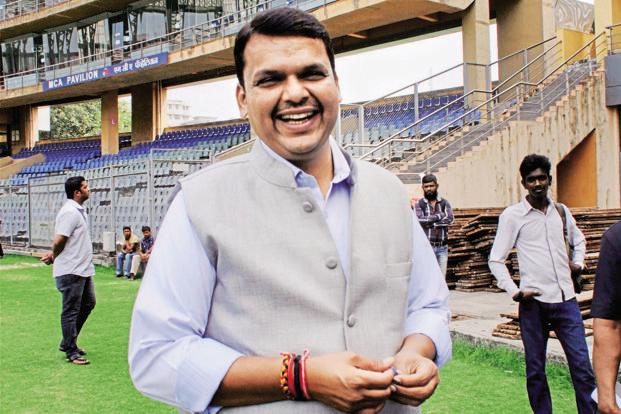 The Maharashtra government is investing around Rs5,000 crore in the Digital Maharashtra project which in the first phase will digitally connect 29,000 gram panchayats across the state, said chief minister Devendra Fadnavis on Wednesday.
The Maharashtra government is investing around Rs5,000 crore in the Digital Maharashtra project which in the first phase will digitally connect 29,000 gram panchayats across the state, said chief minister Devendra Fadnavis on Wednesday.
He said by 2018 end the state will digitally connect these village bodies under a programme called MahaNet, which is part of BharatNet or Digital India. The programme will ensure quality education, healthcare, better access to government services and markets.
Maharashtra announced a partnership with Cisco for the programme. Fadnavis said the state would also be partnering with other domain players and companies for MahaNet.
The chief minister inaugurated Cisco's new manufacturing facility at Pune. Cisco CEO Chuck Robbins said the company would partner with Maharashtra to deploy a smart city digital framework in Nagpur, facilitate digital learning for students and skill development for local entrepreneurs in Mumbai's Dharavi slum, expansion of the Cisco Networking Academy, and digital education and healthcare initiatives in Fetri village in Nagpur district.
Asked how much Cisco is investing in India, Cisco India president Dinesh Malkani said the company had a policy to not disclose the size of its investments. "But I can announce the job creation that Cisco would help generate. For every job that we add in our manufacturing facility, we create 10 more jobs in the ecosystem that develops," he said.
Cisco will establish 25 Cisco Networking Academies in Maharashtra to train and skill approximately 10,000 students by 2020, Malkani said.
Over 740 tribal students in residential schools died in last 10 years
Mumbai:MMNN:10 Oct. 2016
 Over 740 students studying in residential schools across Maharashtra have died due to malnutrition and other health related issues in the last 10 years, according to an internal report of the Maharashtra government's tribal development department. There are a total of 552 residential schools for tribal children in the state run by the department.
Over 740 students studying in residential schools across Maharashtra have died due to malnutrition and other health related issues in the last 10 years, according to an internal report of the Maharashtra government's tribal development department. There are a total of 552 residential schools for tribal children in the state run by the department.
The tribal population is largely concentrated in regions like Dhule, Nandurbar, Jalgaon, Nashik, Palghar, Raigad, Ahmadnagar, Pune (Sahyadri region) and in the eastern forest districts like Chandrapur, Gadchiroli, Gondia, Nagpur, Amravati, Yavatmal and Nanded (Gondwana region).
"The internal report of the tribal development department has found that on an average, 70-80 students from tribal residential schools die every year and in the last 10 years over 740 has died," an official from the department said. "The government has formed a committee to study the issue and suggest ways to improve the situation. Their report is awaited," he added.
Activists working in the tribal areas allege that lack of health services and basic amenities provided by the government are the main reasons for their death. "Tribals are the most neglected community. Of the 552 government run residential schools, only 50-60 get drinking water from pipeline, which is the basic need. All other schools either get water from a tanker, a borewell or well water to drink," alleged Kavita Ware, who has done her masters in Philosophy (M Phil) on tribal residential schools and an activist working for tribals.
Apart from providing basic amenities like good food, drinking clean water, the government should fill all vacant posts in the residential schools and funds should get utilised in a proper manner, she said. Vijay Jadhav, joint secretary of Shramajeevi Sanghatana, an NGO working for tribal welfare in Palghar district, said students should be screened at least twice a year but the government does not act until an untoward incident takes place.
Radhakrishna Vikhe-Patil, Leader of Opposition in Maharashtra Legislative Assembly had recently demanded resignation of Tribal Development minister Vishnu Savara alleging neglect towards issues of tribals.
217 bribery cases yet to be investigated by Maharashtra ACB
MUMBAI:MMNN:10 Oct. 2016
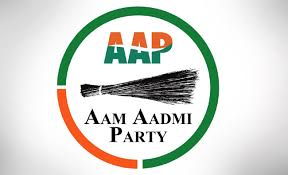 Investigations in as many as 217 bribery cases are pending before the Maharashtra Anti-Corruption Bureau (ACB) as the 29 concerned government departments are yet to give sanction for prosecution. Of these, 99 cases are pending beyond the stipulated 90 days period.
Investigations in as many as 217 bribery cases are pending before the Maharashtra Anti-Corruption Bureau (ACB) as the 29 concerned government departments are yet to give sanction for prosecution. Of these, 99 cases are pending beyond the stipulated 90 days period.
Under the Prevention of Corruption Act, 1988, the state must give the go ahead for prosecuting the accused government servants in court. Without prior sanction, the court cannot take cognisance of these cases. The sanctioning authorities must study the evidence and write to ACB regarding clarifications or doubts.Only when the authorities are convinced, do they give sanctions.
"We are trying our best to ensure that we get the sanctions for these cases as soon as possible. We have sent reminders to the concerned departments. If the sanctions are delayed by more than 90 days, then filing the charge sheet against the accused will also be delayed. If we go ahead and file the charge sheet without the sanction, then the court will discharge it. We have no option but to wait," said official from Maharashtra ACB, requesting anonymity.
A majority of the 99 pending cases are from the home department, gram vikas/zilla vikas/panchayat samitis and the education department. All of them will now be put before state chief secretary Swadheen Kshatriya.
The departments with whom the cases are pending will have to explain to Kshatriya why they have not given their sanction and what is causing the delay.
"I will be reviewing these cases.Action will be taken," Kshatriya told.
Praveen Dixit, former Maharashtra director general of police, who had cracked down on corruption during his stint as director general of the Maharashtra ACB, said the law needs to be amended. "Reforms are required. The law needs to be amended.
There is no need to obtain sanction from the government in cases where a government servant is caught red-handed. Taking bribes is not part of his duty. The law is atrocious. I urge the members of parliament to ensure stern action against corruption," he said.
Reservation demand for Marathas gathers steam in Maharashtra
Mumbai:MMNN:6 Oct. 2016
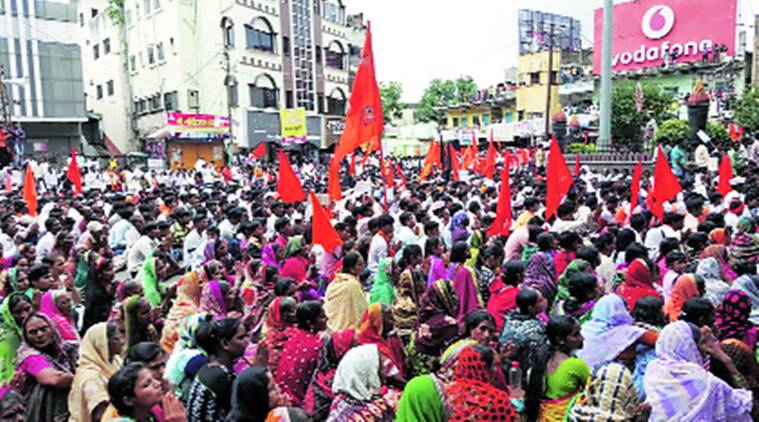 Even as silent rallies are being taken out by the Maratha community in Maharashtra, the debate over reservation in jobs and education for the community also gained ground on Wednesday, with the government planning steps in that direction.
Even as silent rallies are being taken out by the Maratha community in Maharashtra, the debate over reservation in jobs and education for the community also gained ground on Wednesday, with the government planning steps in that direction.
Chief Minister Devendra Fadnavis convened a meeting of senior politicians from various parties, legal luminaries, and bureaucrats at his official
South Mumbai residence to consider steps to defend the reservation in court.
The Bombay High Court is scheduled to hear the issue on October 13. Following the meeting, Maharashtra Cultural Affairs Minister Vinod Tawde said that the government had already collected 70 documentary proofs to back the demand for reservations for the community.
He said the Chief Minister would also be seeking help from the Centre to obtain some more statistical data from the Socio-Economic Census report to bolster its case in court.
Tawde also announced that a battery of senior lawyers, including Harish Salve, Ravi Kadam, and VA Thorat will represent the state government in court.
Besides Tawde, Revenue Minister Chandrakant Patil, Public Works Department Minister Eknath Shinde, Leader of Opposition in the Legislative Assembly Radhakrishna Vikhe-Patil and Nationalist Congress Party MLA Ajit Pawar were present for the meeting.
As centre mulls sugar imports, Maharashtra closing stock maybe 11 lakh tonne
MUMBAI:MMNN:6 Oct. 2016
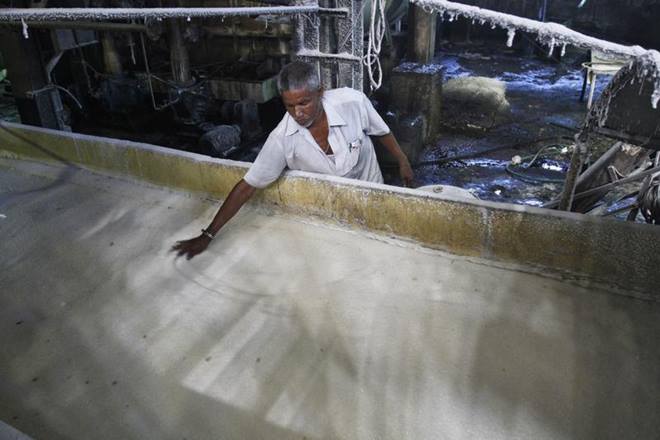 Even as reports are rife in the market that India may possibly import sugar against the backdrop of a likely reduction in production in the sugar season of 2016-17, the figures released by the Maharashtra sugar commissionerate reveal a different picture for the state.
Even as reports are rife in the market that India may possibly import sugar against the backdrop of a likely reduction in production in the sugar season of 2016-17, the figures released by the Maharashtra sugar commissionerate reveal a different picture for the state.
Maharashtra may end up with a closing stock of 11 lakh tonne at the end of the 2016-17 season, despite a shortfall in production estimated for the season, and therefore the state would still continue to be in a comfortable position, Vipin Sharma, Maharashtra sugar commissioner, said. According to the data released after the Cabinet ministers' meet in Mumbai, the state will begin the season with an opening stock of 32.7 lakh tonne. The the total production for the season of 2016-17 is likely to touch 50.28 lakh tonne (against 84.50 lakh tonne last year) at a recovery rate of 11.3%, while 72 lakh tonne (against 75.5 lakh tonne last year) of sugar is expected to be consumed, which leaves a closing balance of 11 lakh tonne with the state, Sharma pointed out. Around 155-160 mills are expected to crush cane in the 2016-17 season, which is slated to begin on December 1.
The monthly consumption of sugar in the state comes to some 6 lakh tonne and even if the season begins on December 1, as has been decided in the meeting of the Cabinet ministers, the state will have enough sugar on hand even during the festive season and may not have the need to import, the commissioner said, adding that a decision regarding imports rests with the Centre and he could not speak for the stock position of other states. There has been speculation in the market that the country may have to have to import sugar to tide over a possible shortage in stocks and keep a check on rising prices. The quantity is expected to be around 16 lakh tonne, according to market reports.
According to the commissioner, even if one takes the ceiling on the stocks on mills at 37% as decided by the Centre, Maharashtra mills are well within the prescribed limits. As on September 30, 2016, the mills were supposed to have stocks of some 41.63 lakh tonne under the 37% criteria prescribed by the Centre and in comparison, only 33.6 lakh tonne remain with the millers, he said.
By October, mills are to have 24% of sugar stocks and still, mills are within the prescribed limits at 33.6 lakh tonnes, he said. The state government has approached the Centre with a request for a two-month extension on the directive to reduce the sugar stocks of mills to 37% by the end of September.
In 2015-16, around 81.4 lakh tonne was sold at an average of some 6.5 lakh tonne per month, he said. Of the 184 mills, some 44 mills have excess stock and have missed the September 30 deadline, he said. Around 16 factories have more than 50% stock. In September alone, some 8.5 lakh tonne of sugar was sold, he said.
Interestingly, in 2015-16, the season lasted for 117 days and this sugar season may not last for even a 100 days, even less than the season of 2008-09, which is a record for Maharashtra, he said. In 2008-09, the Maharashtra sugar season lasted for barely 80 days. This is perhaps the most delayed start for a season and may even surpass the record of 2008-09, Sharma said.
Incessant rain ends years of drought but damages crops in Marathwada
Mumbai:MMNN:3 Oct. 2016
 Marathwada, the central Maharashtra region which faced severe droughts in the last four years, now has a problem of plenty with incessant rains causing flooding in many parts.
Rains have been lashing all the eight districts of the region in the last one week, damaging Kharif crops, state authorities said.
Marathwada, the central Maharashtra region which faced severe droughts in the last four years, now has a problem of plenty with incessant rains causing flooding in many parts.
Rains have been lashing all the eight districts of the region in the last one week, damaging Kharif crops, state authorities said.
Almost all the major and medium dams including Manjra, Ujani and Terna are overflowing for the first time since 2010. Heavy rains lashing the region led to flood like situation in Latur, Beed and Nanded districts, though the State Disaster Management Unit (SDMU) in a statement issued this evening stated that rains had now stopped and flood waters had begun to recede.
Heavy rains threw vehicular traffic out of gear on Aurangabad-Solapur national highway. A swollen Terna river near Ujjani village in Ausa tehsil of Latur district cut off all links to the village and nearby areas.
The heavy rains also led to foggy conditions in parts of Osmanabad district. As per the rainfall statistic released by the SDMU for June to September this year for Marathwada, barring Aurangabad (87.2 per cent) and Hingoli (98.9 per cent), rest of the districts - Jalna, Beed, Latur, Osmanabad, Nanded and Parbhani - have recorded rainfall in excess of 100 per cent.
Average annual rainfall for Aurangabad division for June-September period is 721.2 mm; this year the rainfall has been 780.4 mm, 108.2 per cent of the average.
Latur which had received drinking water by railway wagons in April-May has recorded rainfall of 949.6 mm against average of 725.3 mm.
Since the morning, Latur district has recorded a rainfall of 73.9 mm.
Across the state, Konkan division with 114.7 per cent rainfall is at the top of the table. The average rainfall in Konkan region is 2,961 mm, whereas this year the actual rainfall has been 3,397.7 mm, followed by Aurangabad division at 108.2 per cent, Pune at 94.8 per cent, Amravati division at 93.4 per cent, Nashik 87.2 per cent and Nagpur at 84 per cent.
SDMU issued a weather forecast today that there will be one or two heavy showers in Mumbai and suburban areas. The forecast predicts a decrease in rainfall activity by tomorrow in the interior parts of the state, but a likelihood of heavy rain continuing in North Konkan districts.
The spell of heavy rainfall comes just before the state cabinet's weekly meeting on October 4 at Aurangabad. Chief Minister Devendra Fadnavis had tweeted last night that National Disaster Relief Force (NDRF) platoons had been sent to Latur and Nande, and helicopters of Indian Air Force were on stand-by.
In all 1,265 people who were stranded in various parts of Latur district were evacuated to safer places.
Maharashtra CM Devendra Fadnavis declares Nagpur first digital district of India
MUMBAI:MMNN:3 Oct. 2016
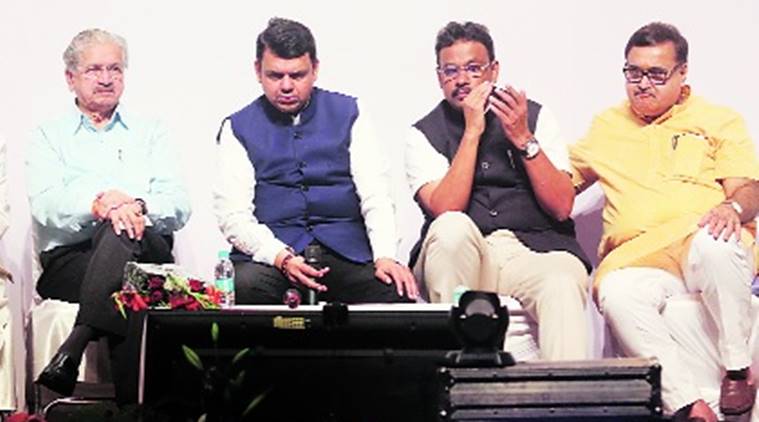 Chief Minister Devendra Fadnavis Sunday declared Nagpur as the first digital district of India. At a function in Mumbai, he said all 29,000 gram panchayats across Maharashtra would be digitally transformed by December 2018.
Chief Minister Devendra Fadnavis Sunday declared Nagpur as the first digital district of India. At a function in Mumbai, he said all 29,000 gram panchayats across Maharashtra would be digitally transformed by December 2018.
Stating that technology would play a critical role in bringing socio-economic changes in the lives of people, Fadnavis said, "All 776 gram panchayats in Nagpur district have been digitally transformed, paving the way for better healthcare and education through high intensity communication and connectivity." He said digital revolution was integral to bringing "greater accountability and transparency in the system".
During his visit to San Francisco last month, Fadnavis said, multinationals like Oracle and Cisco agreed to partnering the project both through investments and by sharing technology knowledge.
At the function, the CM held interactive sessions with three Nagpur villages through video-conference - Brahmni ,Dongargaon and Belda - to ascertain what difference digitisation has made in their lives.
Shubhangi Ravindra Patil of Dongargaon, who is associated a village self-help group, said, "I do the business of selling 'agarbatti' (incense sticks). The wi-fi connectivity has helped to explore new markets and better financial prospects. Now, we earn upto Rs 15,000 per month, which is shared among the women in the self-help group."
Interacting with the ashram shala (residential school) children at Belda, Fadnavis asked them if they used internet to play games or studies. The children unanimously responded that it was helping them seek new information related to their studies.
From Brahmni village, a farmer shared his experience: "The wi-fi helps to monitor the climate changes and accordingly engage in agriculture activities based on the guidelines.
It also opened new markets where we can bargain for farm produce and earn higher remuneration."
Campaign against illicit liquor
The Maharashtra government also announced a campaign against illicit liquor. In his message, Social activist Anna Hazare said, "I have always fought against illicit liquor and would support the government's campaign."
The chief minister said, " In Kopardi case (where a minor girl was raped and murdered), the culprits had consumed illicit liquor before committing the brutal act. While the culprits will surely be hanged to death, we want to uproot the illicit liquor dens and its selling in state." He urged district officials and police to take the campaign on mission mode.
Govt adds 169 new online services
The state has added 169 new online services under the Right to Information Act, taking the total number of services to 369. Through Aaple Sarkar portal that was launched last year, individuals across the state can avail any of these 369 services online.
Maharashtra forest ministry to appoint one crore tree ambassadors to conserve forests, plant saplings
Chandrapur:MMNN:30 Sept. 2016
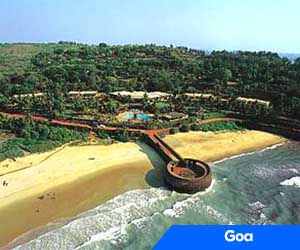 One crore 'tree ambassadors' would be appointed across Maharashtra to help achieve the government's aim to plant 50 crore saplings in the next phase of the plantation drive.
One crore 'tree ambassadors' would be appointed across Maharashtra to help achieve the government's aim to plant 50 crore saplings in the next phase of the plantation drive.
The announcement to this effect was made by state Forest Minister Sudhir Mungantiwar after he inaugurated a 'Transit Treatment Centre' for wildlife in Chandrapur on Thursday.
Lauding the dedicated efforts of forest officials and the staff in making the earlier tree plantation drive in July a great success, Mungntiwar assured them all cooperation in their endeavour for forest and wildlife conservation.
Now, the target for tree plantation has been enhanced from two crore to 50 crore.
As a part of its efforts to make the plantation drive a success again, the government has decided to appoint one crore 'tree ambassadors' (vruksha doot) across the state.
The ambassadors shall give an undertaking that each one of them shall plant one sapling every year and also that they shall act as vruksha mitra to take care of the survival and conservation of trees in the state, the minister said.
Mungantiwar, who also holds Finance portfolio, said the definition of economic prosperity has changed in recent times.
"It is not per capita income that decides prosperity of any country but it is in terms of per capita happiness. Bhutan has topped the list of per capita happiness as it has more trees per person compared to any other country in the world. More the tree, the more is happiness among the people," he said, while stressing on the need for more trees and forests in Maharashtra to make people happier.
He also described the launch of the transit treatment centre in Chandrapur as one of the most important and positive steps initiated by the government for conservation of wildlife.
The centre, spread over 370.25 square metres, comprises an OPD, operation theatre, rooms for doctors and storage of medicines along with a couple of open cages for the treatment of animals.
The facility would be available for immediate medical treatment to wild animals injured or rescued from the forests.
Senior forest and veterinary officials were also present on the occasion.
Maharashtra gives farewell to Southwest Monsoon with good rains
MUMBAI:MMNN:30 Sept. 2016
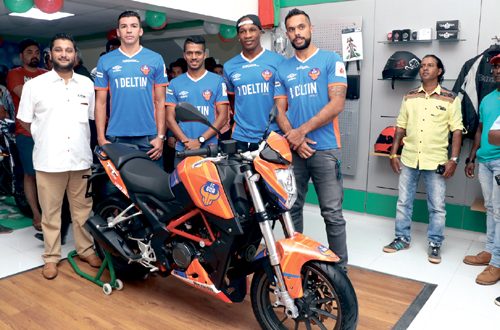 Maharashtra has received good rainfall during entire Southwest Monsoon this year. Last couple of weeks were a miracle for the entire state where most of the regions have witnessed decent downpour.
Maharashtra has received good rainfall during entire Southwest Monsoon this year. Last couple of weeks were a miracle for the entire state where most of the regions have witnessed decent downpour.
The cyclonic circulation which yesterday was over north Chhattisgarh now lies over South Chhattisgarh and adjoining Vidarbha region extending up to 3.6 km. In the wake of this weather system, light to moderate rains have blessed parts of the state in last 24 hours.
Rainfall recorded in last 24 hours from 08:30 am on Thursday is as follows: Yeotmal recorded 24.8 mm of rainfall, Amravati 14.6 mm, Nagpur 9.2 mm, Chandrapur 9.1 mm, Pharbani 8.7 mm and Burdhana 8 mm showers,
During the similar time frame, few light spells were also recorded in Gondia which observed 5.4 mm of spells, Kolhapur 2.5 mm, Satara 4.5 mm and Sangli recorded 0.8 mm of wet spells.
As of now, the aforesaid weather system is likely to move further towards west. This would further create possibilities of moderate to heavy rains over some parts of the state particularly over Vidarbha and few isolated parts of Madhya Maharashtra for another 24 hours. Moreover, light showers can make their appearance over most of the northern region of the state for 24 hours.
Thereafter, these rains are likely to intensify gradually. Not to forget, Southwest Monsoon has played its best over the state of Maharashtra and most of the regions would bid adieu to the same with a rain surplus statistics.
At present, talking about the overall Monsoon stats of the state, Konkan and Goa has been crowned as the best performing region observing a 22% rain surplus, on the other hand, Marathwada stands at 21% rain surplus and Madhya Maharashtra observed 13% more rains than its normal while Monsoon concluded with 8% more rains over the Vidarbha region.
Hence, in a nutshell, it can be concluded that Southwest Monsoon was almost above normal for the entire state.
Maratha morchas: Maharashtra govt should pay attention to the demands of this united front
Mumbai:MMNN:26 Sept. 2016
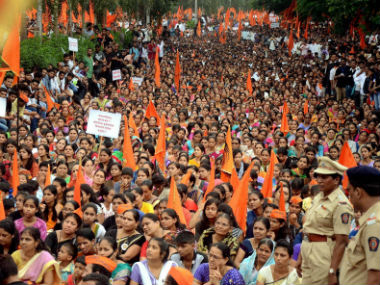 Bharat Ratna Dr Babasaheb Ambedkar gave a mantra of 'Learn, Unite and Agitate'. He gave this mantra and appealed to his followers to unite because he was aware of the significance of being united even after independence as much as before independence.
Bharat Ratna Dr Babasaheb Ambedkar gave a mantra of 'Learn, Unite and Agitate'. He gave this mantra and appealed to his followers to unite because he was aware of the significance of being united even after independence as much as before independence.
There is no other option before the elements of society but to get united in order to attract the attention of the prevailing political system toward their vital demands and burning problems. Moreover, whether it is the ruling party or parties in opposition, both get attracted towards the possibility of gaining votes from such a united front of concerned social elements. Every political party desires to offer their active support and necessary help to all such united fronts either because of the temptation of winning votes united under the patronage of such fronts (provided they address the demands) or because of the apprehension that the opposition parties will benefit if they themselves fail to introduce a solution for their problems.
The entire state of Maharashtra is experiencing this reality against the background of the massive processions being organised by the Maratha community through the length and breadth of the state. It is precisely because of this reason the ruling coalition has been compelled to pay attention to the demands raised by the Maratha community.
In fact, one must accept that these massive processions of the Maratha community are being rated as a truly historical phenomenon. I say this not only because these processions will probably make an impact on the political structure of the state in the near future. This is particularly so because barring a few organisations or bodies, this community lacks the background of a united social strength. Besides, the social, economic and political problems confronted by the Maratha community too are different subject to different geographical regions of the state since this community is geographically scattered throughout the nook and corner of the state. Most often, this geographical diversity is also preserved during matrimonial alignments. Above all, social discrimination on the basis of 96 Kuli, Deshmukh, Patil and Kunabi Maratha, too are adhered to in this community till this date. It is for this reason that there has been a widespread belief that it will be impossible for this community to form a united front in spite of its impressive numerical strength. So it must be considered an exceptional event that such a huge agitation comes into being in a remarkably disciplined manner.
It must be said that the Maratha community was completely ignorant of its might except when its clout was taken into consideration in politics. But today, not only the people belonging to the Maratha community but also the prevailing political organisations are being forced to take a serious note of the growing strength of this community, thanks to the massive crowds gathering at these gigantic processions. The political pundits who were more keen on nabbing the prime mover, real or imaginary, hidden behind these processions are now being compelled to study the social panorama that has ignited this flame. Most importantly, no political party is in a position to simply brush aside these processions as shrewd political manoeuvres of the opposition parties since no political party has sponsored these processions.
It is expected that the government will pay more careful attention to the demands of the Maratha community, especially if all the elements such as senior citizens, students, educated elite and married women have developed a feeling of injustice being meted out to them. Some of their demands are fully justified and they should be accepted forthwith and the government should seek a communication with this community about what can be done about their remaining demands. It is only through such exercises that people's faith in the political system can be preserved. The government must not undertake any steps which are rooted in political bias. Rather, it should exhibit its sincerity by addressing the problem immediately.
The main demand of the Maratha community is pertaining to reservation. There is no doubt that reservations are not the only remedy for the community's backwardness. However, if reservation is the only political remedy available in the present political system to other backward communities, why should the Maratha community not get it Nobody has any doubts about the backwardness of the community. I am myself a member of this community and I travel widely and frequently in Konkan (also throughout the state). So, I observe at close quarters harsh and fierce reality of the economic backwardness of my brethren. Large parts of Konkan are mountainous. And landholdings do not yield sufficient agricultural income. Agriculture is therefore declining in importance as a source of income. Want of education forces most people of this region to Mumbai in search of small and medium jobs.
This explains why many of Mumbai's slums are occupied by Marathas from Konkan. In Marathwada too, a large proportion of families are dependent solely on agriculture. That is why majority of the suicides are committed by members of this community.
The whole of this social phenomenon is being seen as the discrimination between the established and the displaced - the haves and the have-nots. Along with the leaders from the Maratha community, leaders from other communities too have occupied important posts. In those communities also, there is a so-called established class. But the Congress party has enjoyed political power for most of the past years and unlike the RSS ideology, the Congress party leadership refuses to take only one community into consideration. Therefore, talk of the rift between the established and the displaced as the reason for such massive protests is clearly intended to divert the attention from the demands of the community and thereby create a division in the agitation.
The chief minister has assured the students of the Maratha community about the reimbursement of their fees. But this promise cannot be fulfilled without reservations. He also said that reservation in government service is unlikely to result into substantial gains and there is a need to foster entrepreneurship in the community. But he has not made it clear how the entrepreneurship of only the Marathas will be developed. Such promises are therefore likely to engender a feeling that the government is not serious about reservations.
The next demand is about the changes in the Atrocity Act. This act, passed by the Congress, is aimed at protecting the Dalit community from violence. Leaders of those who participate in the Maratha processions have made it abundantly clear that their demand is not that the Atrocity Act should be repealed but that it should not be abused. Dalit leaders too have echoed the same opinion. If such a large section of the population is expressing such apprehensions, who can say that the demand for government's attention to this issue is misplaced The patronage of the Atrocity Act belongs to the Union government. Under such circumstances, if the minister in charge makes misleading and mischievous statements, it surely is a disgrace to him. In the Solapur Maha-Morcha, a TV journalist had asked a teenage participant why she garlanded Babasaheb's statue at the start of the morcha. Her reaction is highly eloquent. She said, "I am a daughter not only of Chatrapati Shivaji Maharaj but also of Dr Bheemrao Ambedkar."
Congress is firm in its resolve that the Atrocity Act must not be repealed. Our policy takes its source from our commitment to the Dalit community.
Finally, we turn to the Kopardi rape case. This case is being put forward as the immediate cause of the ground swell that has risen in support of the community's demands. The public from all over the state has unanimously condemned the act and has demanded that the perpetrators be hanged. However, it is manifestly wrong to look at such issues from the communal angle. Communal considerations should never be allowed to enter into considerations of such crimes. The government ought to give the impression that it is determined to punish the guilty regardless of their community. One therefore wonders what the government's intention was in refusing permission to some leaders to visit Kopardi.
Fortunately, the Maratha community's agitation, unlike the agitation of Patels in Gujarat and Jats in north India, has been free from violence. But it certainly is strong enough to compel the introspection upon the political leadership. The government therefore has the opportunity to demonstrate its seriousness about the community's demands.
A clandestine effort also is being made to use the agitation to create division between the Maratha community and other communities. Ministers of the government are themselves indulging in opportunistic handshakes to launch similar agitations of the other backward communities. If such fishing in troubled waters is avoided, a peaceful and democratic solution of the problem can surely be found.
The Maratha agitation has performed a path-breaking effort in this direction.
The question is whether the government will respond with due earnestness.
Barvi dam affected villagers demand proper rehabilitation
MUMBAI:MMNN:26 Sept. 2016
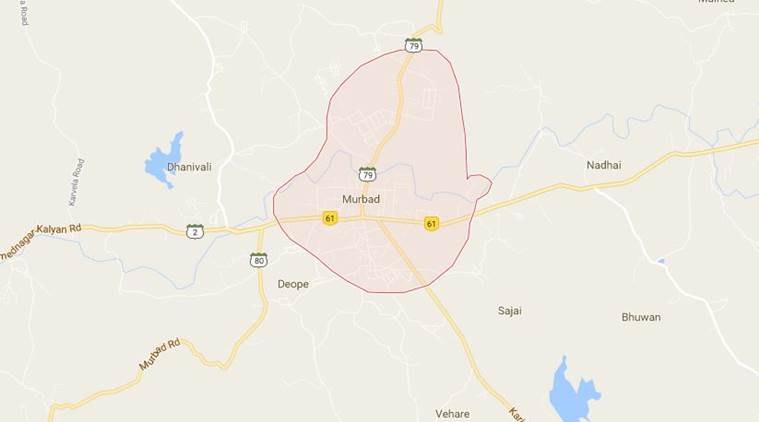 Thousands of villagers from Murbad taluka in the district, who lost their land due to construction of the Barvi dam, have demanded for proper rehabilitation and compensation.
Thousands of villagers from Murbad taluka in the district, who lost their land due to construction of the Barvi dam, have demanded for proper rehabilitation and compensation.
Barvi Peedith Seva Sangh president Kamlakar Bhoir told media persons here today that they want their long-pending demands to be met or else the villagers would resort to agitation.
He said last week hundreds of villagers from Murbad taluka had carried out a peaceful protest at the local tehsil office to draw the attention of the government towards their woes following flooding of the villages due to release of dam water after heavy rains.
About 29 villages have been affected due to the dam which was constructed in 1972 for supply of water to the urban towns and cities.
Bhoir said the government has not taken the issue of rehabilitation of the affected people seriously.
He said some of the families were rehabilitated in the first phase of the projected but they were being shifted now which was not proper.
The government should carry out a proper survey and resolve the issue completely, he demanded.

